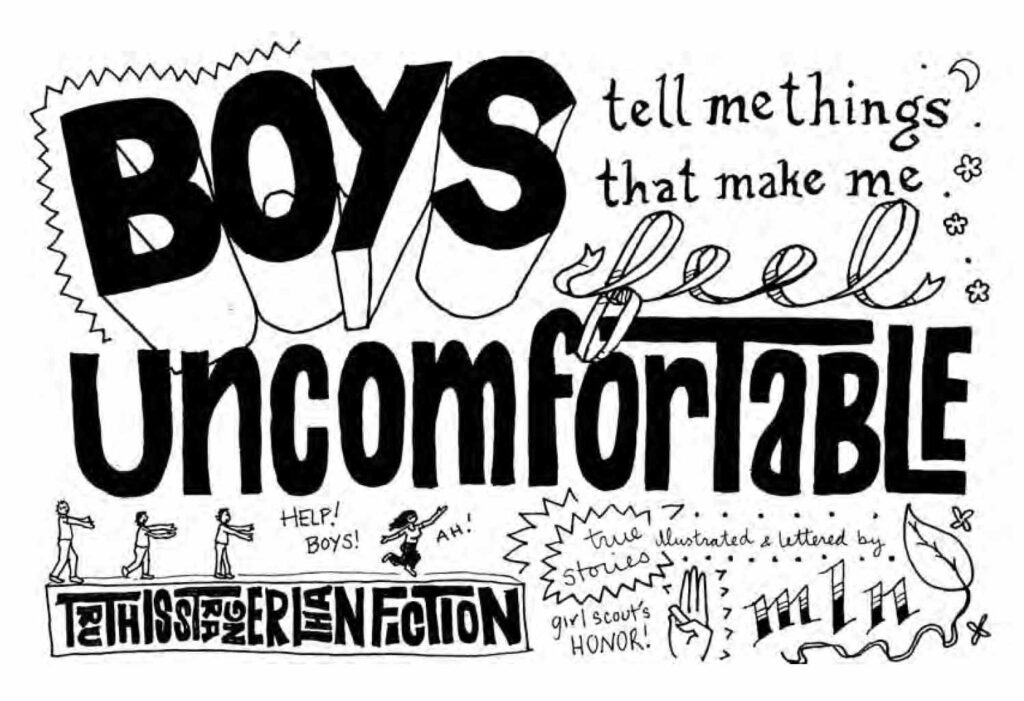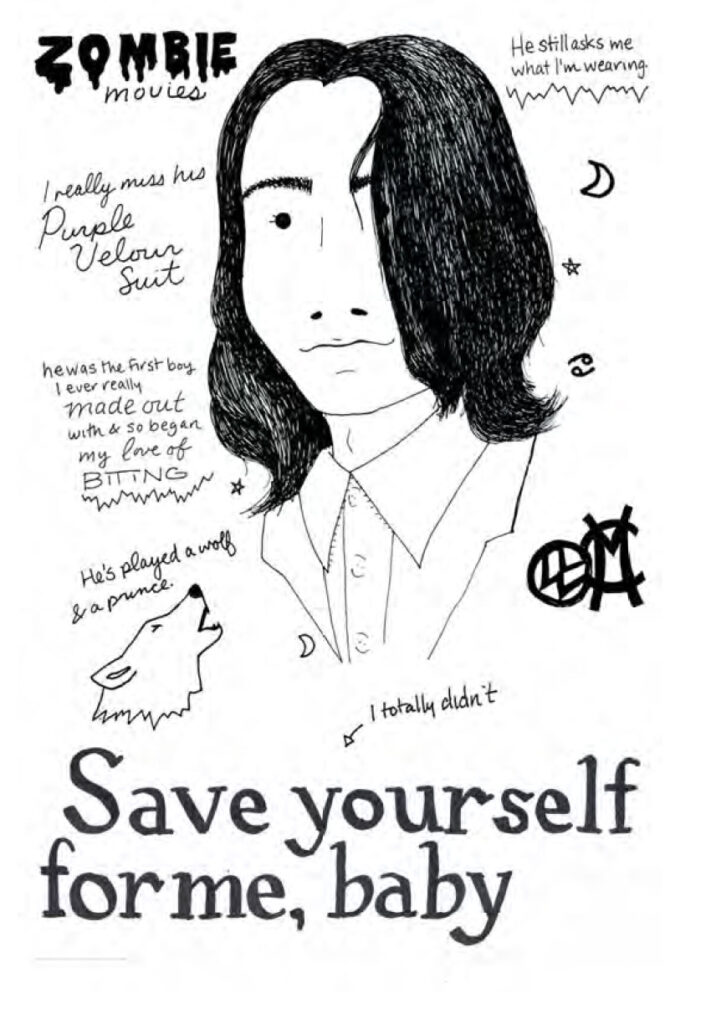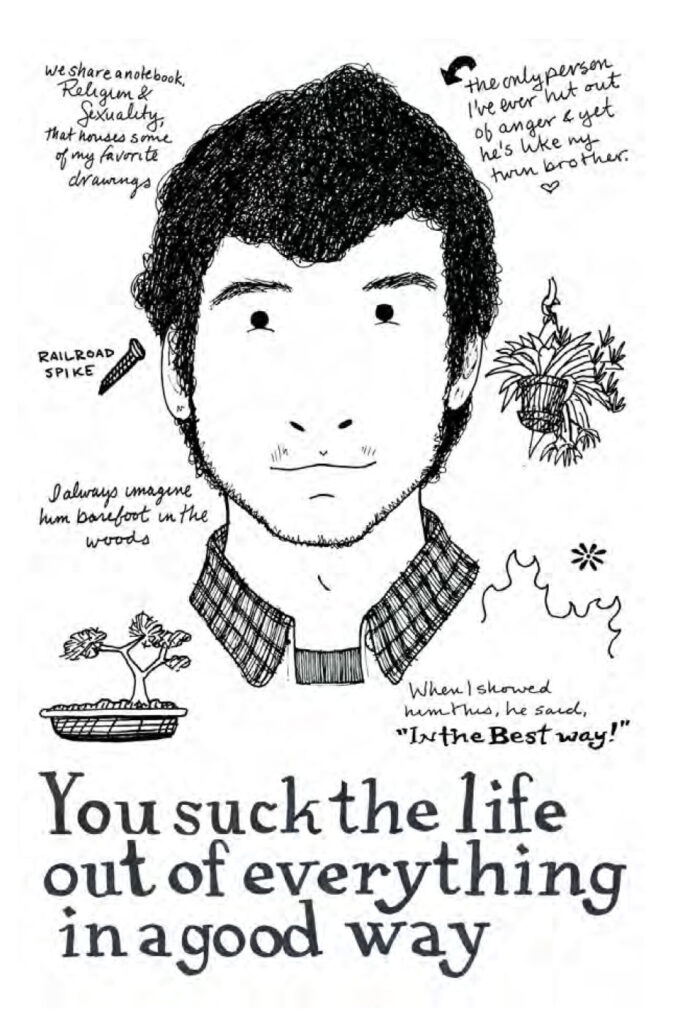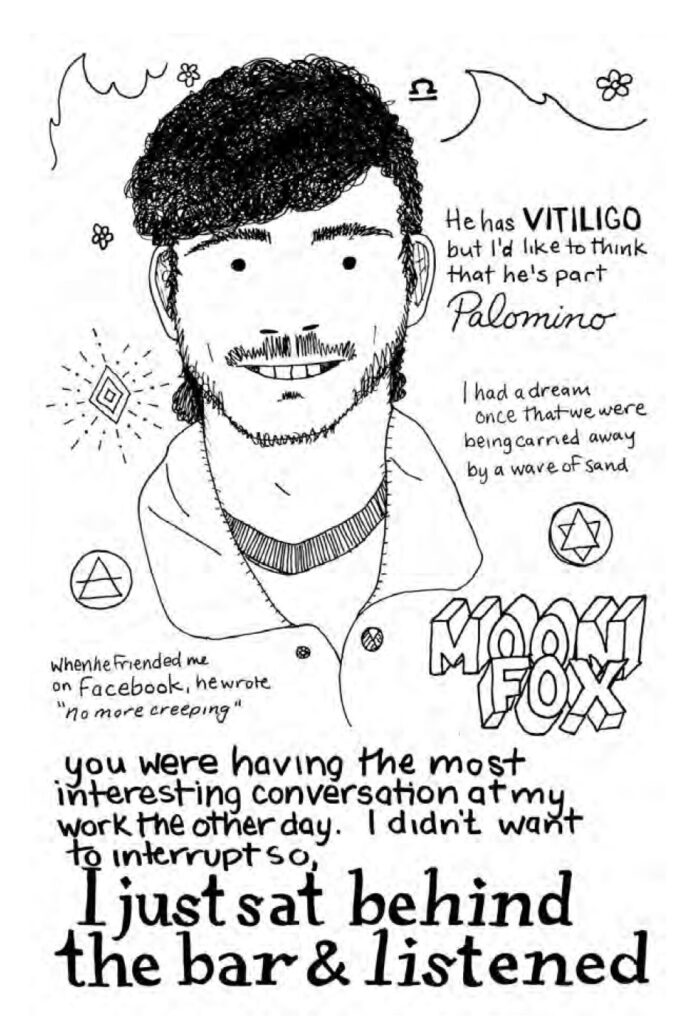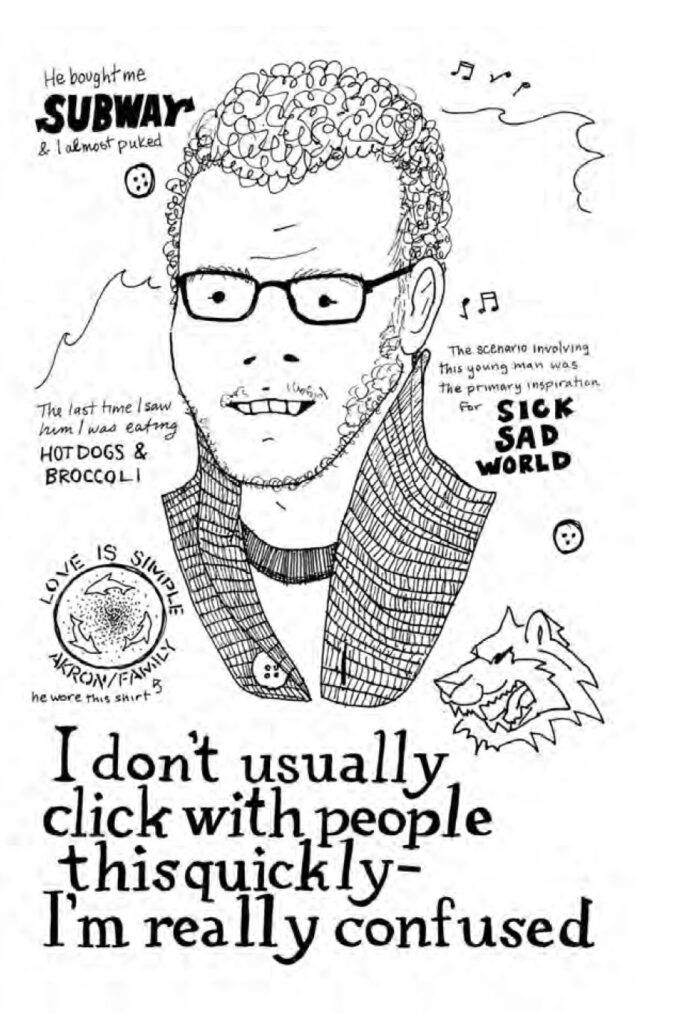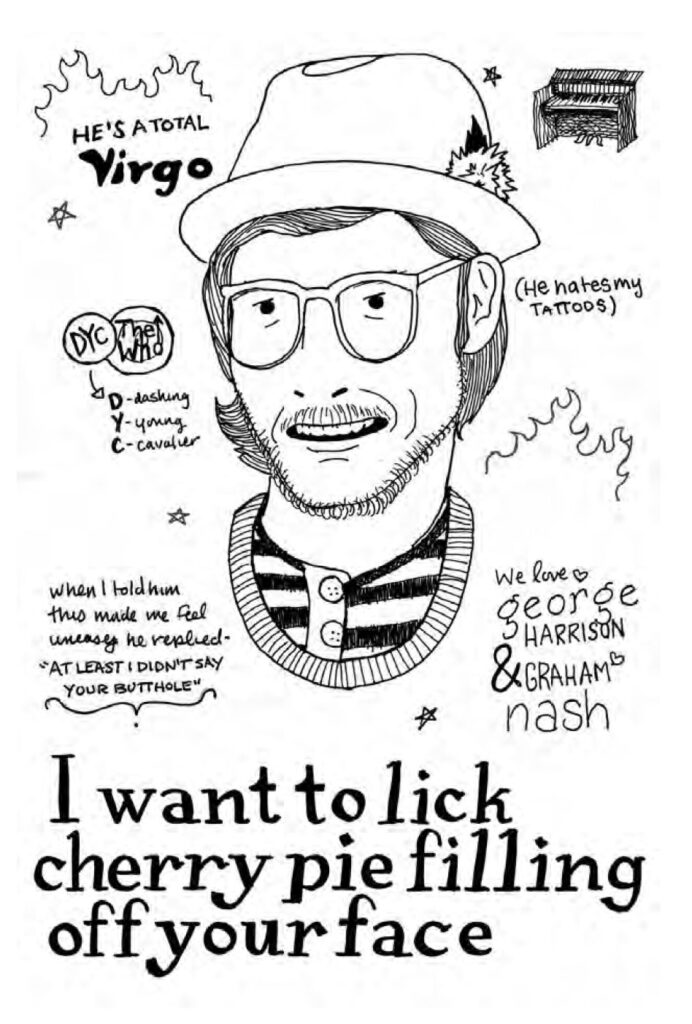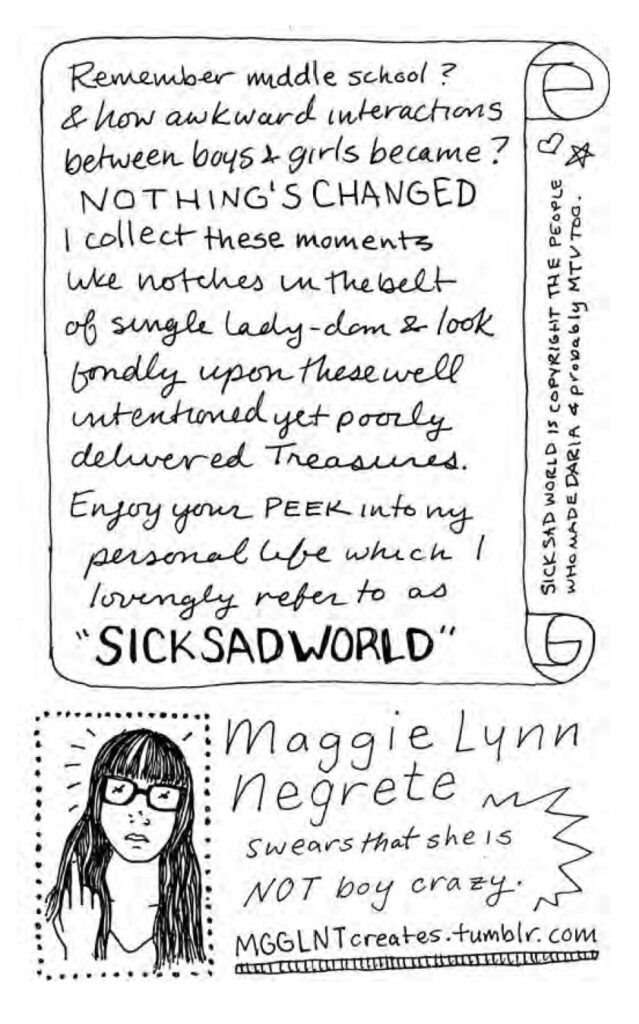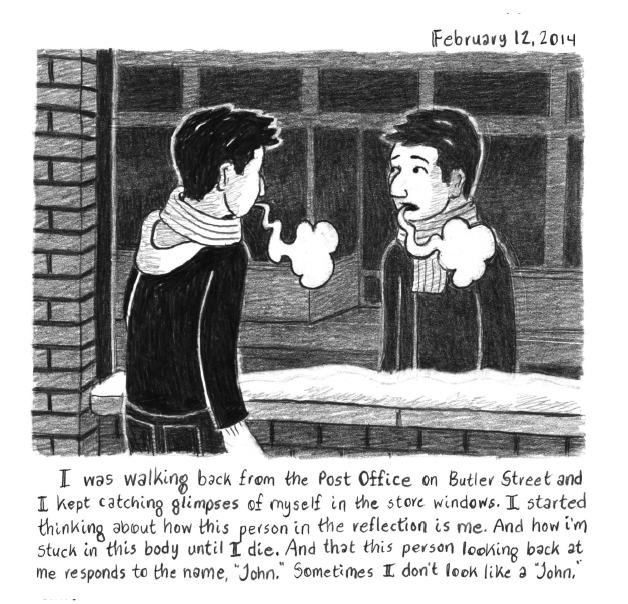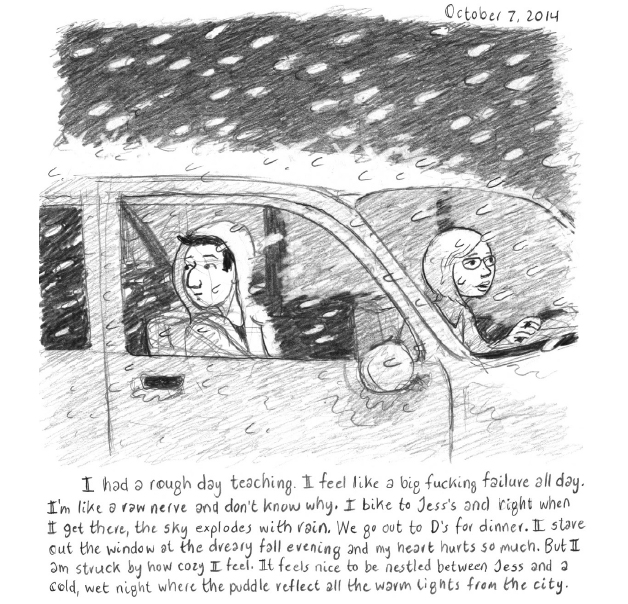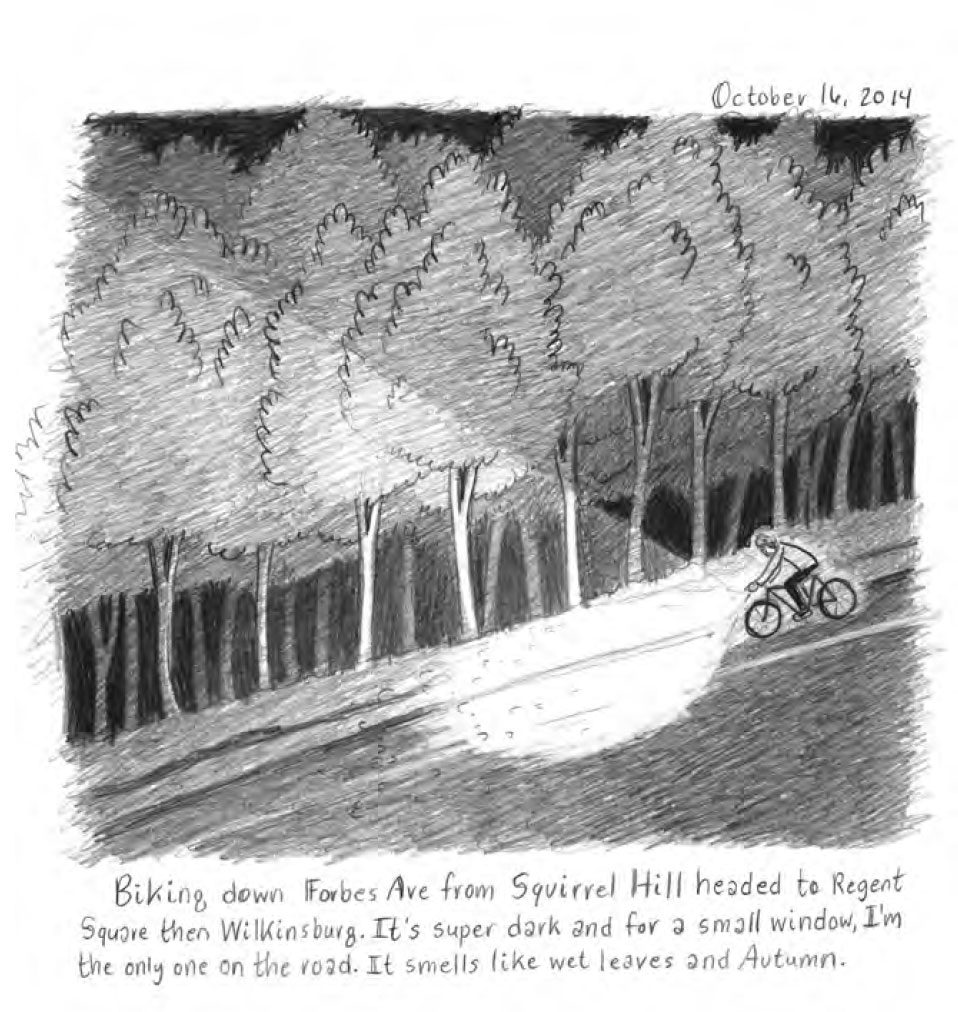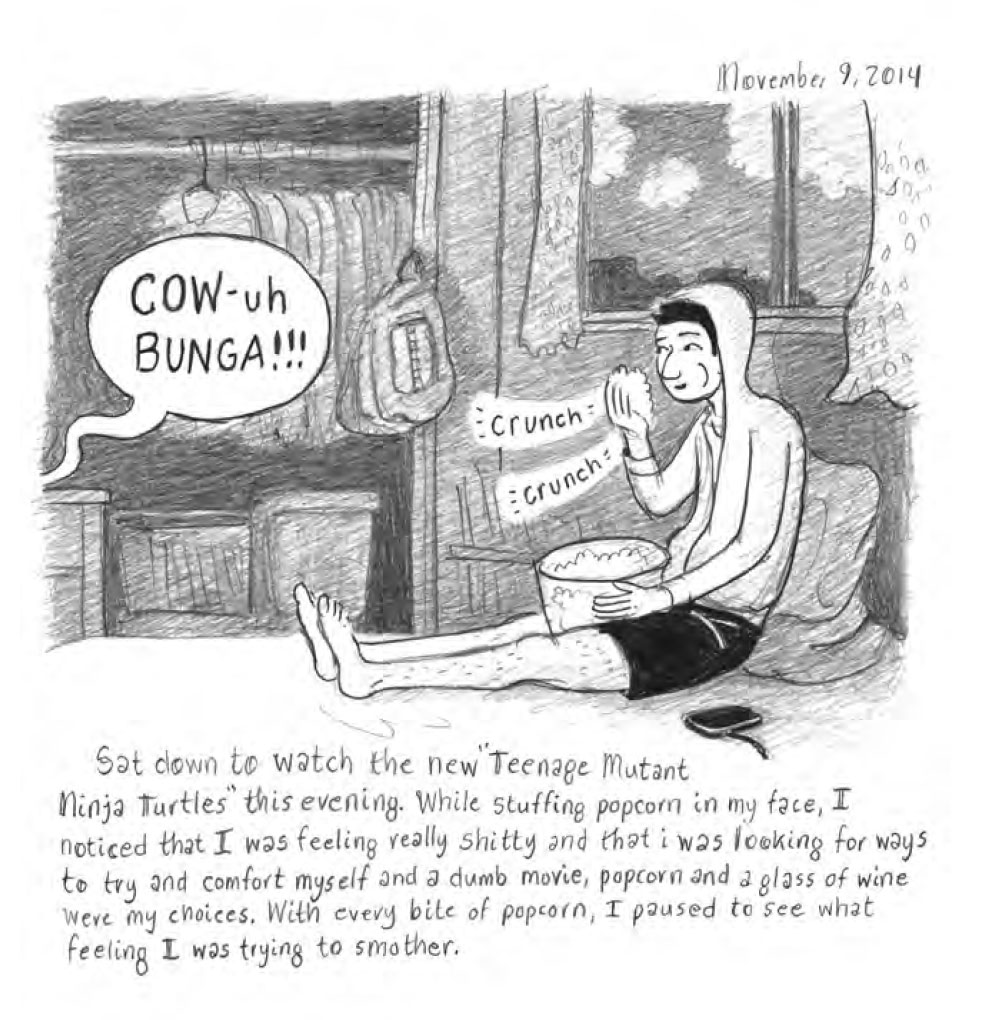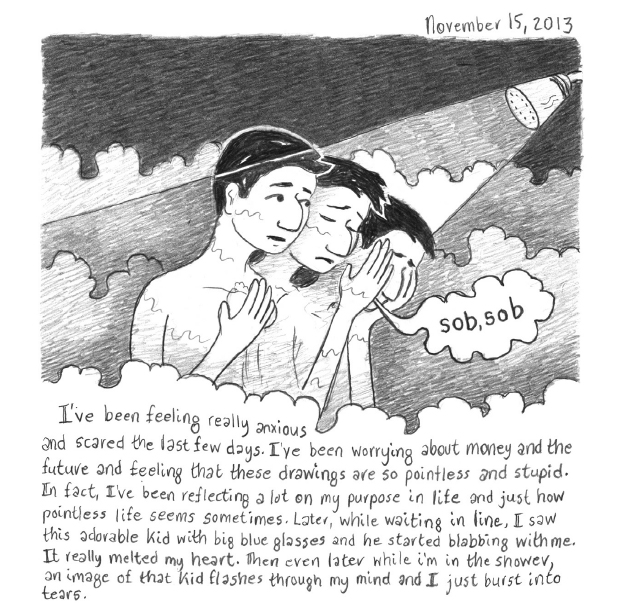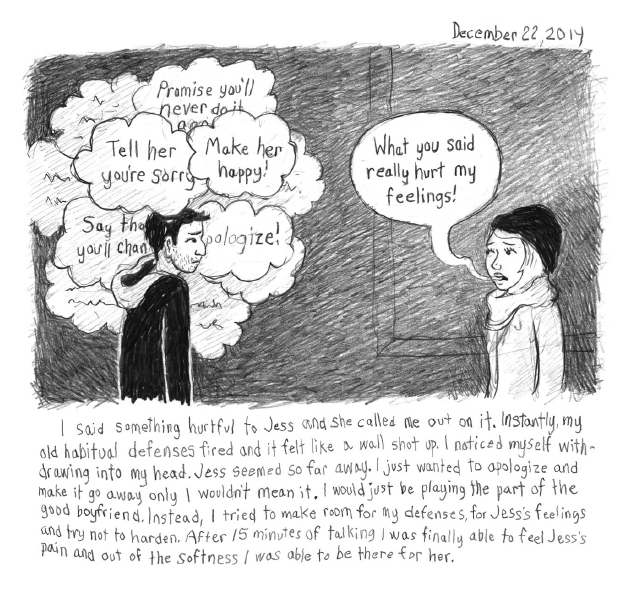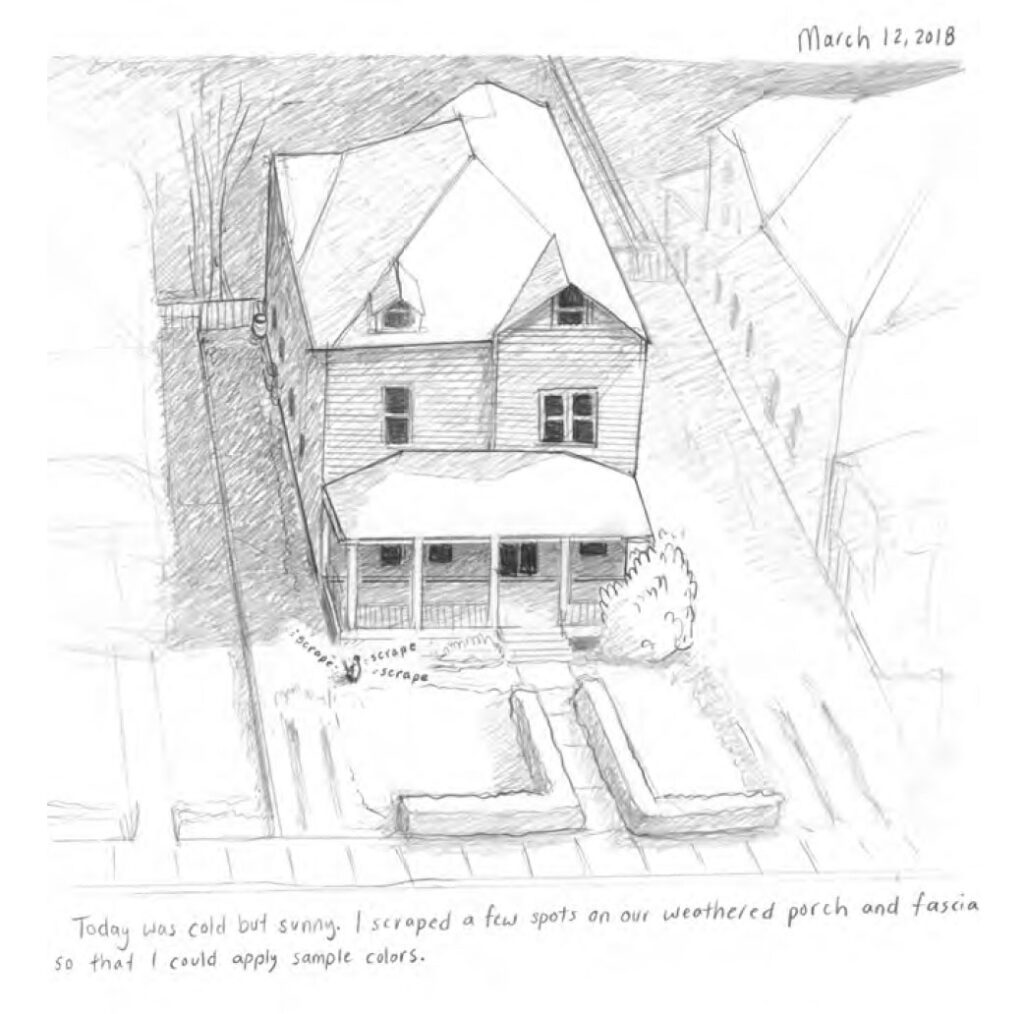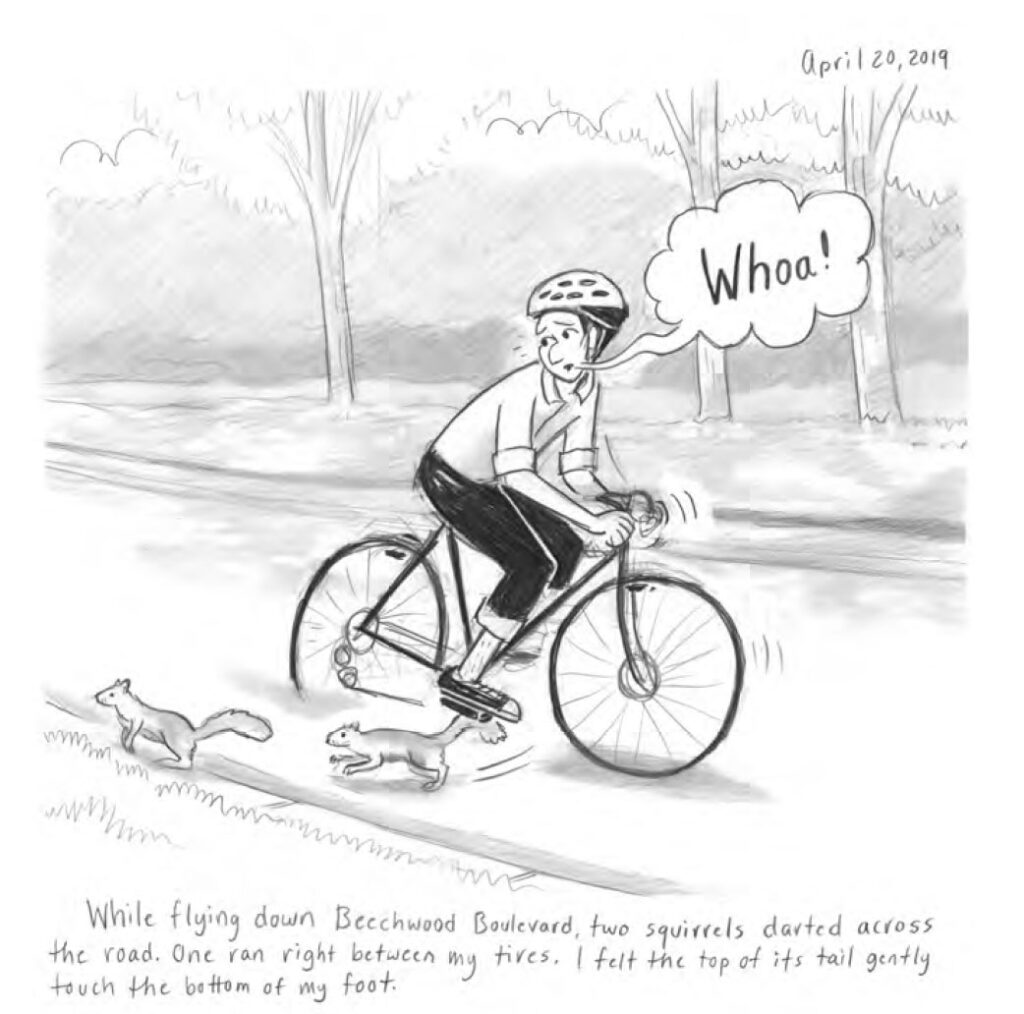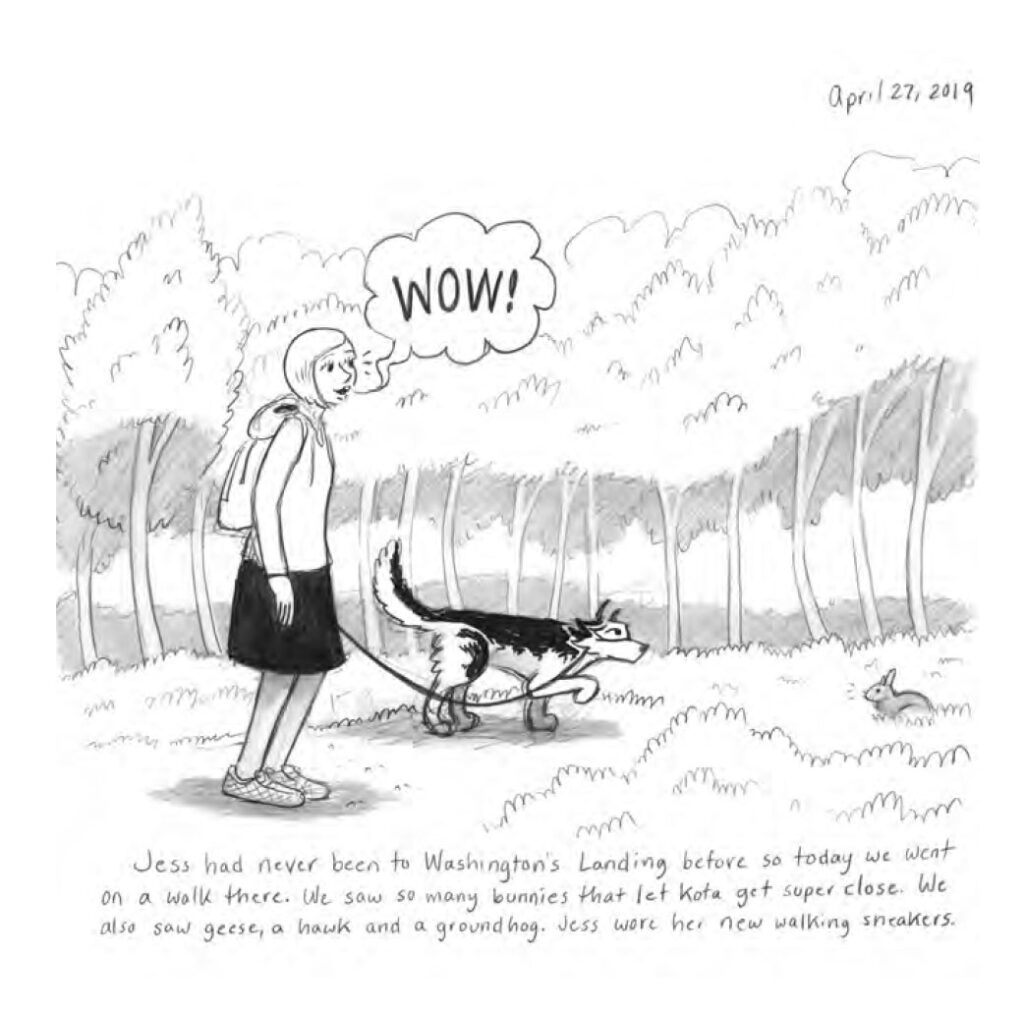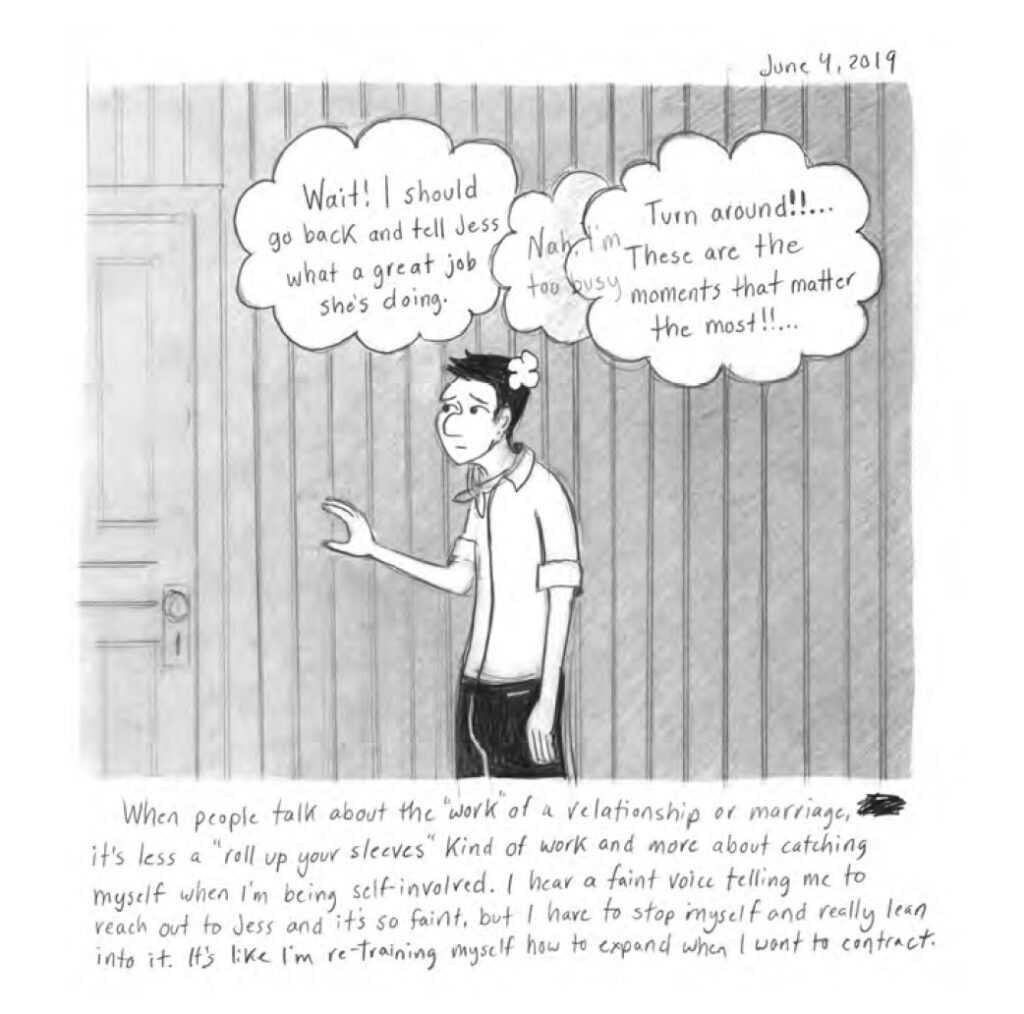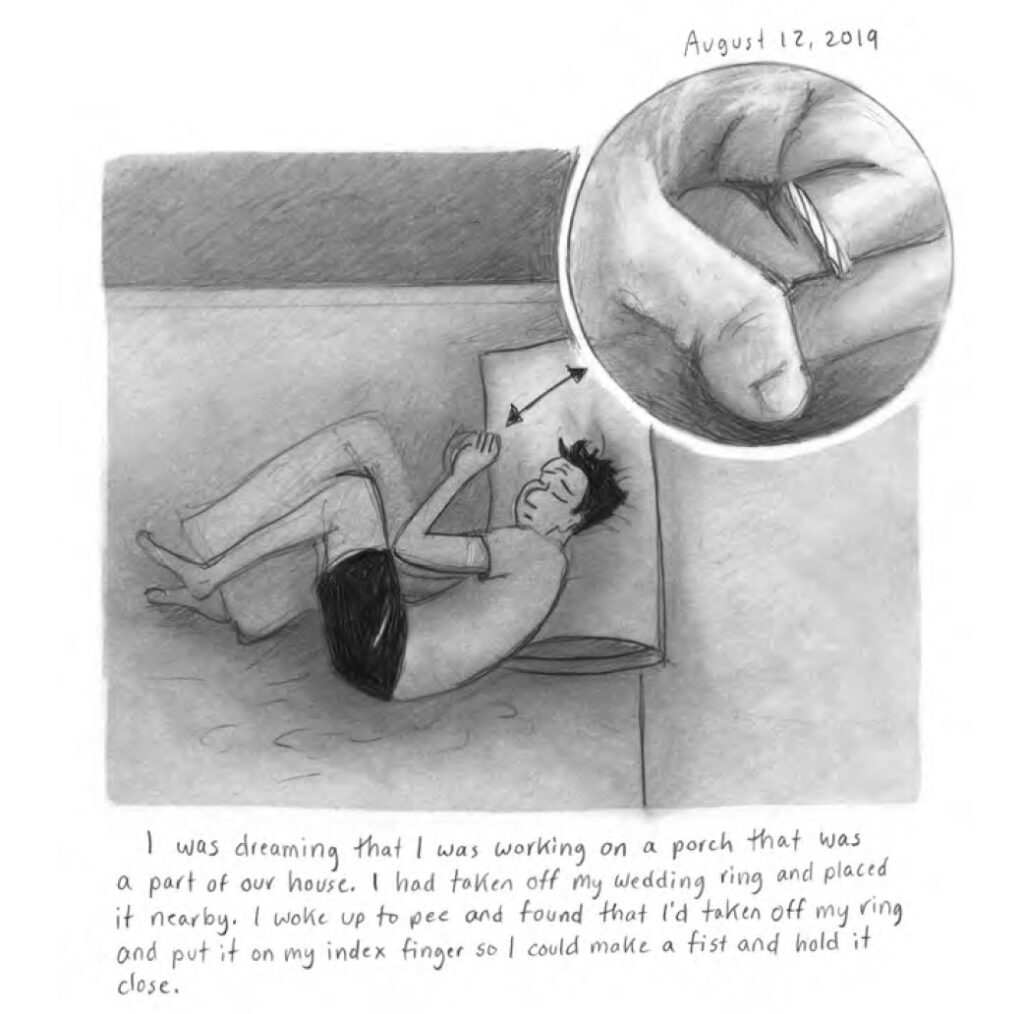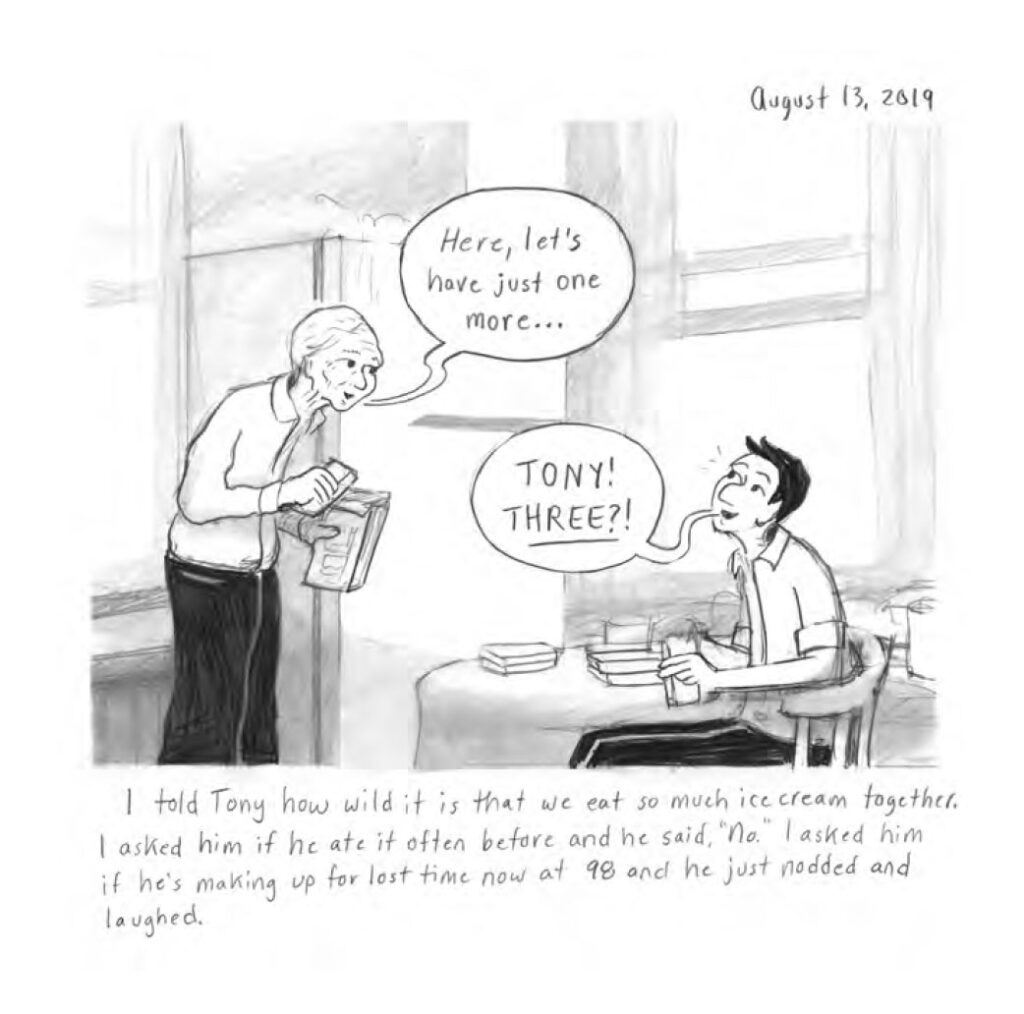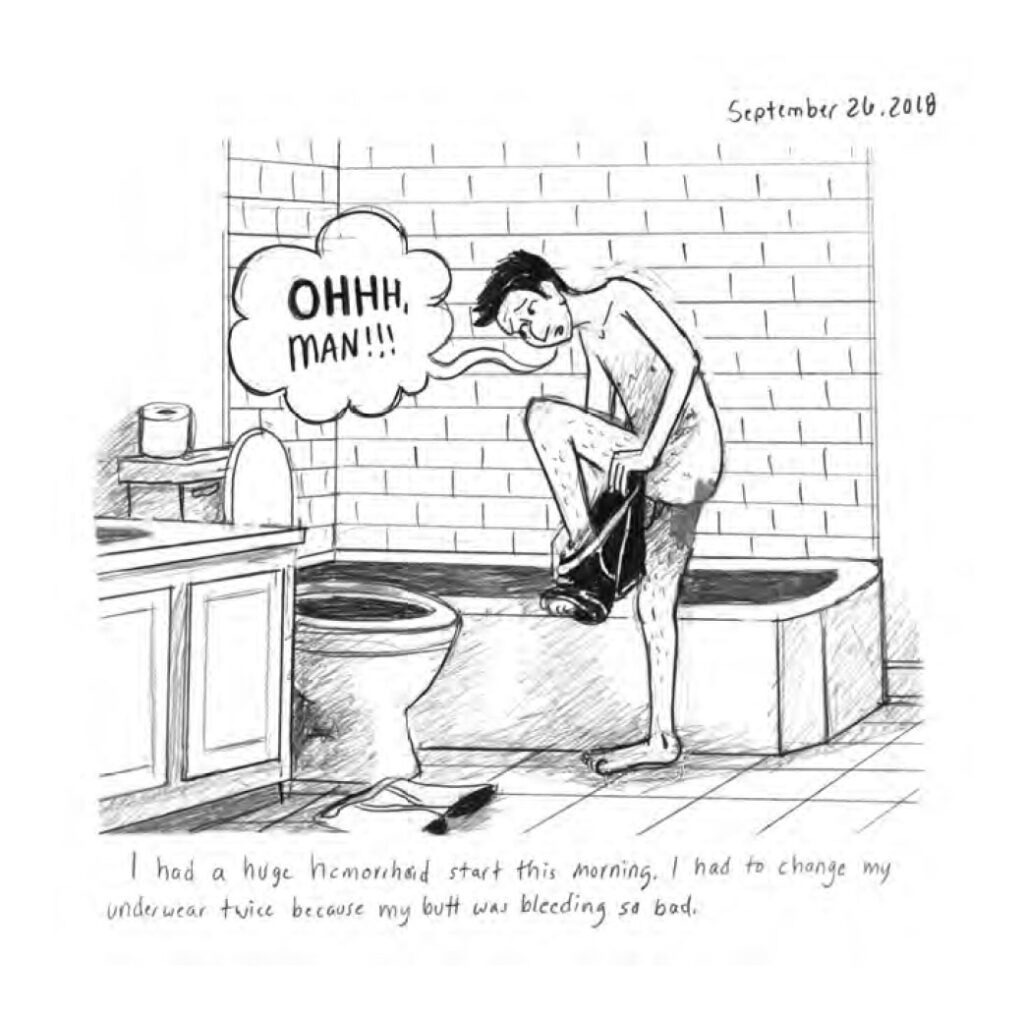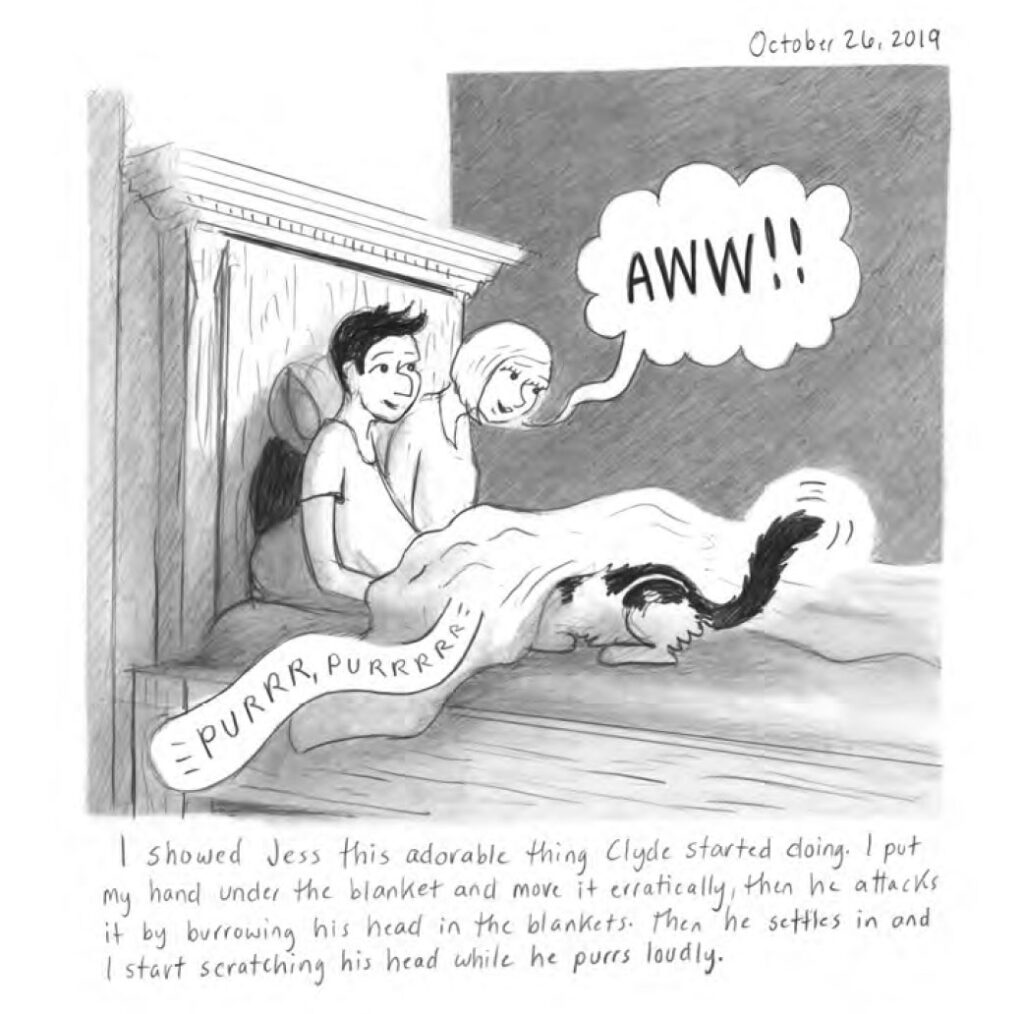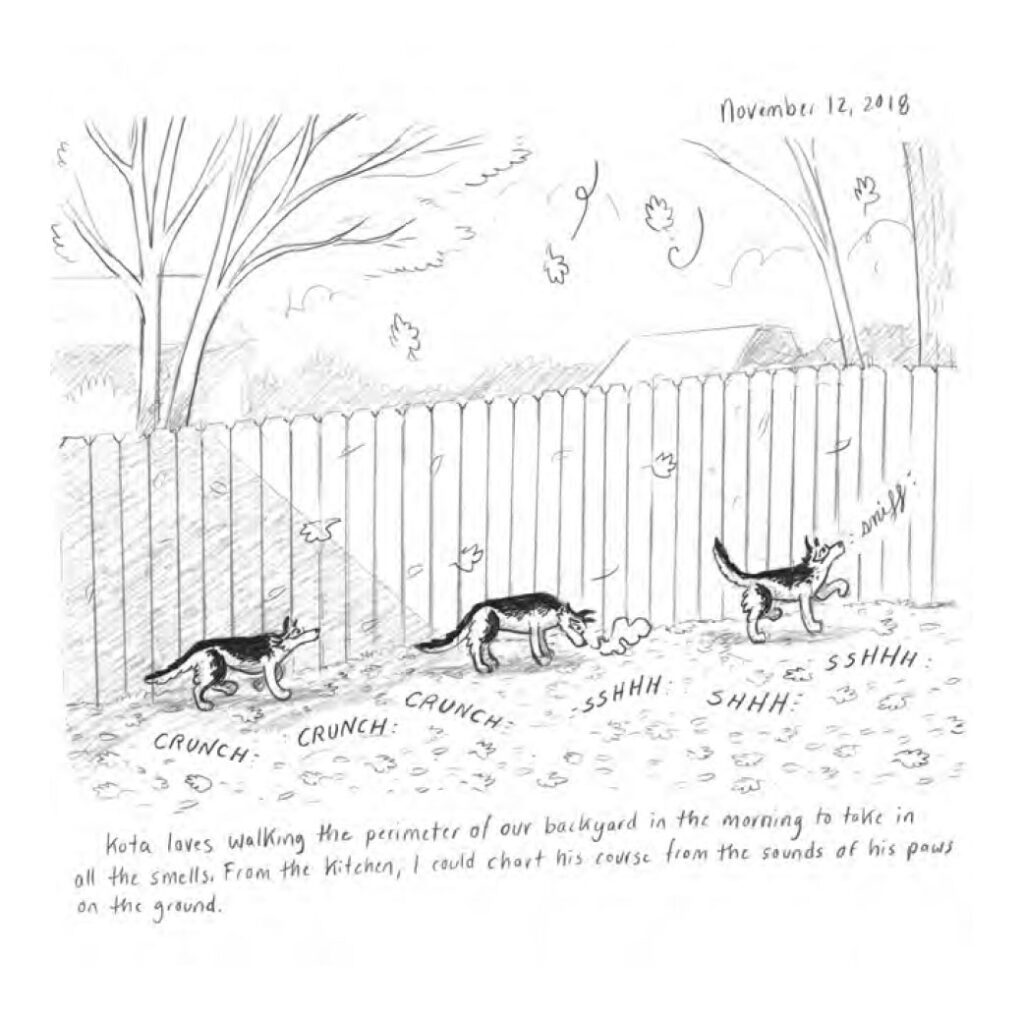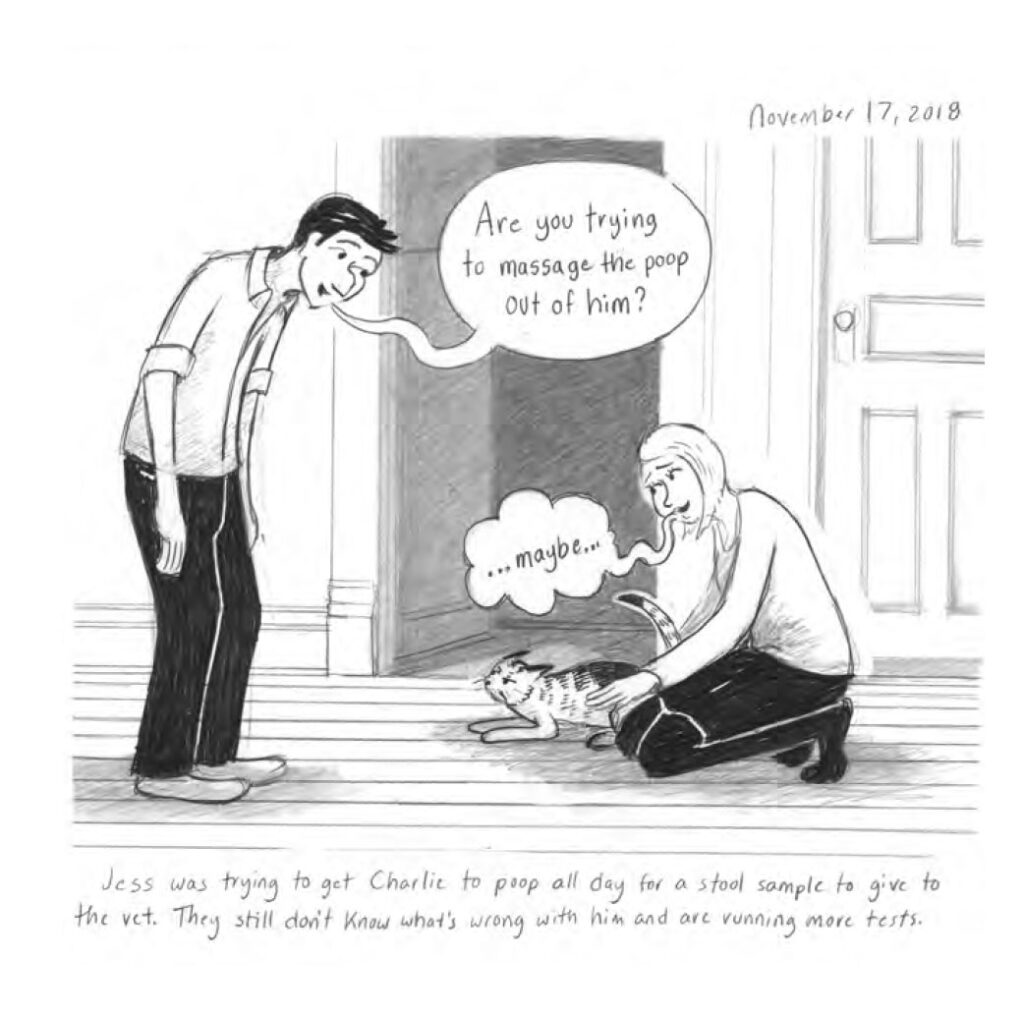TABLE OF CONTENTS
Issue 15
Naked Barbie
Christopher C. Slomiak
Untouchable
Christopher C. Slomiak
Stereophonic
Bill U’Ren
Twenty-One
Bill U’Ren
Decorations
Meredith Sue Willis
Thought Balloons
Meredith Sue Willis
A Lesson in Fire
Chuck Augello
A Lesson in Ice
Chuck Augello
POETRY
Song of Deborah
Gerald Stern
Grandfathers
Gerald Stern
Blue Jay
Gerald Stern
Ich Bin Jude
Gerald Stern
Send Something Back
Anne Marie Marcari
I Ash My Body
Peter Patapis
Rivulet
Peter Patapis
To Formulate a Definition
Eric Pankey
What Nationality?
George Higgins
Slue
George Higgins
Fifteen
Kristen Jackson
Lisa’s Baby
Kristen Jackson
Advice From a Middle-Aged Man to His Teenage Self
Steve Westbrook
Advice From a Teenage Boy to His Middle-Aged Self
Steve Westbrook
I GO TO SEE A PLAY ABOUT COMPETITIVE
AIR GUITAR (REAL PLAY, REAL THING) AND
WIND UP FEELING SEASICK
Kevin Kantor
FEVER DREAMS (FRACTIONS)
Kevin Kantor
Aunt Jemima’s Revenge
Allison Joseph
Godot Goes to Montana
Ellaraine Locke
Abandoned Garden
Ellaraine Locke
The Grievous Math, The Revised Definitions, and The Continuing Adventures of Economic Reform
Jim Daniels
The Oxymoron of Gun Control and The Boogie Woogie of Assassinations
Jim Daniels
Spiders
Donna Pucciani
Incremental
Donna Pucciani
Easy to Say
Jason Schneiderman
Catastrophist
Jason Schneiderman
Lionheart
Dawn Morrow
Smoke
Dawn Morrow
Dirge for a Young Country
Huang Xiang
CREATIVE NONFICTION
Interview with Gerald Stern
Nancy Barta-Smith
The Art of the Chirp
Dominic Civitella
Why I Won’t Lay
Sean Prentiss
A Working Theory of Love
Sean Prentiss
For Whom?
Allen Gee
Asians in the Library
Allen Gee
Strike Talk
Asians in the Library
Allen Gee
Queens of Slippery Rock
Anna Swartwout and Brenna Waugaman
There’s a Crack in Everything
Morgan Bazilian
Recipes for Ladies Who Want to Reduce
Ellen VanWoert
TEXT & IMAGE
Boys Tell Me Things that Make Me Feel Uncomfortable
Maggie Lynn Negrete
Puntos de Referencia
Maggie Lynn Negrete
Daily Geology (2013-2014)
John Peña
Daily Geology (2018-2019)
John Peña
The Big Date
Ed Piskor
POETRY
Gerald Stern
Song of Deborah
When she gathered her people she said “enough of
hills” and “stop climbing,” especially women,
especially if you don’t want muscular calves like
that and block the entrances for I will sing you a
song of lush meadows and show you where to plant
your corn, though your tomatoes nearer the tents,
and peppers too, for there will be soups, but in the
meantime I’ll start my song for that is good for
breathing, especially at these heights and don’t look
back for you could lose your balance—after all,
you don’t have hooves to jump from rock to rock
and, after all, your babies make you heavy, the
poets you carry.
Gerald Stern
Grandfathers
One of them poured hot lead
into a bucket of cold water so he could
make determinations from the shapes
of the hardened metal for he was chasing
the odd intrusions in a small girl’s body,-that’s the religious one. He was a rabbi of sorts.-
the other had a small tobacco factory
on the third floor of his house and he engaged
a lehrer for the women there co-determinous
with Tampa and Havana though the language was different
so I was only half crazy at the most,
for there was a little sanity in both of them
though more I believe in him with the three floors
than him with only one workable room,
the kitchen and the bedrooms unthinkable,
and I am loyal to the nth degree
whatever they would have thought of me
and for one of them I would have carried one book,
for another, another.
It’s all written down in the steam of my bathroom mirror—
if you can read it.
Gerald Stern
Blue Jay
At least I am luckier than that blue jay
hopping along the bulwark his rubber leg
falling back under him absolutely
doomed, the way it is out there.
My heart goes out to him
though he’s more a bully than
any other warm creature that came my way.
I never thought I’d plead for a blue jay
I who haven’t pled for seventy years, I who got on my knees
every night to go through the ritual of my own devising.
I who had no grievances then.
Gerald Stern
Ich Bin Jude
Who was it threatened to murder
a streetcar full of fucking Nazis in Wien
when he was in the country only two hours
and watched the car empty
including the festooned conductor and the decorated motorman?
The rain wouldn’t stop.
The cheapest place in Europe—
September, October, November, 1954.
Your darling city.
Jason Schneiderman
Easy To Say
I
It’s so easy to say, that the bones were broken,
that the body was broken, that the body was on the pile
of bodies, that the body was lifted from the pile
and then the life that had none left did not leave
and then the body returned. It’s a story now, a story
about a body on a pile of bodies, a body that was lifted
from the pile of bodies. It’s a story about a half dug
mass grave, a half dug mass grave that you can close
your eyes and see, that you can close your eyes and
imagine, because you know what a mass grave looks
like, because you watch the television, you saw
the naked bodies as if you were there, you know
everything, you know bodies, you have your own body,
and I wish it well, as I wish my own.
II
After the attack I couldn’t watch films anymore—I couldn’t watch the people pretending
to be hurt, pretending to hurt. I couldn’t watch the fist as it landed, or the bullet as it
entered. I couldn’t watch because the pretend suffering of the pretend people was too
much, and I only wanted to be safe, to be sure, in every minute, that I was safe. No one
can ever know that. No one can ever be fully safe. Which is not to say that we are all
equally in danger. We are not. We are not in this together. We are in this, and near each
other. We are in this, and we will not leave until we are forced to.
Jason Schneiderman
Catastrophist
Your heart doesn’t have to break every day.
It’s OK if sometimes trees are just trees,
and all the leaves on the ground look exactly
like all the other leaves you’ve already seen
in your life-long life. If some days,
you don’t even bother to look closely
at the flowers as you keep on walking toward
wherever you were going, that’s OK too.
Most of life, if you’re lucky, is pretty boring,
filled with unburned houses, uncrashed cars,
unsick friends, unfled countries,
and unshot schools. The parts that hurt—
the parts where you aren’t sure how you’ll live
through them—those only happen to you
in the life you live. In your own life.
I don’t know how to say this,
except that you can only be hurt in the life
you actually live. I’ve spent so much time
in the hypothetical, thinking if I had just left
the house five minutes later, I wouldn’t have been
in that car accident; if I had just worn something
less flamboyant, they wouldn’t have followed
us home; and other things, too, that I’m not ready
to talk about, may never be ready to say out loud.
I once spent three years living a hypothetical life,
living my life like someone who got on the wrong train,
and the right train was on a parallel track, so I could see
the people on the right train but not get to them,
and I lived like someone who had made a mistake
so terrible that I would never be at home in my own
life again. Supposedly, there’s an indigenous tribe
somewhere that measures all other virtues
against fear and caution—that whoever comes up
with the worst case scenario gets to be in charge,
and the children compete over who can express
the most worry and fear, or something like that,
or maybe that was the story they told the anthropologist,
because that was the one she wanted to hear,
or the one she seemed to like best.
When I heard the radio program about them
I thought that I would do quite well among
those people, and I couldn’t quite understand
why the announcer seemed a bit condescending.
I’ve had three catastrophic thoughts today,
and none of them seem likely to come true,
and yet I have been carrying around those fears,
and maybe it would be nice to live among people
who admired me for my fears, instead of wanting to
reassure me of how unlikely they are to come true.
It’s not easy to live just one life, so we tell stories
about time travel and cloning, doppelgangers, and
parallel timelines, but truly, we each live once,
in one direction, with the future unknown
and the past full of whatever it was that happened.
So the more boring each day, the better.
The less fear you can carry, the better, as it has never
actually kept me safe. I hate that essay by
David Foster Wallace about how nothing
in the experience of a chicken would suggest
that it is an animal raised for slaughter,
and that like the chicken, we should mistrust
our quotidian experience. We’re not chickens. The story
I tell myself when I’m afraid of the worst
coming true is that Marie Antoinette was queen
over and over again every single day
for years and years. Her head only came off
once.
Eric Pankey
To Formulate a Definition
How often we are drawn together
By a single act of carelessness
The false positive or double negative
Understood as its opposite
We smear ourselves with ash
To make of the self a void
But instead of disappearing
We leave footprints behind
On the kitchen’s slate floor
The coastline cliffs collapse
Loose threads of rain
Unravel from a cloud sampler
But what is the proximate cause
We learn to discern patterns
And predict the vernal equinox
We hold a curve of willow charcoal
And make a hesitant first mark
Then write a treatise on the nature of things
Allison Joseph
Aunt Jemima’s Revenge
The Chicago-based Quaker Oats Co. has announced a recall of several varieties
of Aunt Jemima’s pancake and waffle mix for possible salmonella contamination.
—United Press Syndicate, March 5, 2008
Finally, she’s got her revenge for decades
of obsequious headscarves and blackface
appropriation, flapjack slavery and erasure
from the history books. She’s no longer
your slave, your anonymous kitchen help
minstrelling through another day with a
happy-face smile, a cakewalk grin. She
has you right where she wants you: feverish
and glassy-eyed, head in the toilet, pleading
for redemption from your own evil.
As a kid, you loved her plump black face
on that bright red box, not knowing she
meant anything other than those fluffy
sugary cakes from your mother’s suburban
skillets, not knowing in vaudeville days,
a white woman with an Italian name
played her sooty-faced in burnt cork.
Later, you learned the first black Aunt
Jemima came straight off a Kentucky
Plantation, hired to bring the World’s Fair
1893’s most startling invention: powdered
hotcakes in a box to a grateful, hungry
nation. But you never thought she’d turn
on you this way—after all, you knew
February was Black History Month, and you
helped your eleven month old scrawl
his “Why Martin Luther King is My Hero”
essay. Why now, you moan, stomach
bucking like a darktown strutter, brain
swimming with unholy visions: Uncle Ben
brandishing Ginsu knives, Charlie Chan
and Betty Crocker swinging nunchucks,
sticks going straight for your head.
Why not now, she replies, never too late
to learn what real food tastes like
coming back up, sardonic grin no longer
the grin of a woman who’s spent
a lifetime making your breakfast
without you ever once offering to make hers.
Dawn Morrow
Lionheart
Black cat sleeps, peaceful, at my feet
as if this is the life she’s always known,
but a torn ear and the scar above her eye
betray her story: she came from the streets.
This warm Chicago afternoon persuades me
to crack the windows open, and she lies,
flat on her belly, body taut, legs stretched out
in her best Superman impression,
her nose picking up a scent.
And, when the man just outside
the gate pulled the trigger seven times
she ran toward the sound, and I hid
in the back of the closet until
I couldn’t hear a man calling for help anymore.
Dawn Morrow
Smoke
Not long ago I heard the three-tone chord
of a car wreck: screech, crunch, wail.
Now, parked just across the street,
the car, its driver’s side doors,
bent at an awkward angle, like a broken bone;
the empty udder of the airbag covers the window.
On her balcony, above the remains,
my neighbor grills, smoke seeping from the charcoal,
and when she opens the lid, it surges
upward on the breeze, an offering to the gods,
a celebration of life, of survival, of a near miss.
Huang Xiang
Dirge For a Young Country
——A Lament for the Terrorist Attack on New York’s Twin Towers of a car wreck: screech, crunch, wail.
In a dream
New York’s two great pointers are severed
The pain pierces me to the bone
Ships traveling the centuries about to sink
And I seem to face a horrible death by drowning
The twin skyscrapers
Are two masts
Abjectly teetering, hopeless
Are two antennae, newly broken,
That desperately call
To heaven for help
Under the clear sky Upon the Earth
Oh God, Oh God, Why, Why
Are You so completely silent
In the twin towers’ savage destruction
My body within their massive forms
Collapses at the same time
They were “murdered”
And I am strangling
They suffer an attack
And blood flows like water from my gaping wounds
Their bones and sinews of steel bend and break
My whole skeleton.
What the towers have lost of themselves
I am now the less
They are leveled flat
And I am crushed to dust
I tell you loudly
I am the skyscrapers,
Proud pinnacles of earthly construction
New York’s landmark is the same as Beijing’s
Landmark, Tokyo’s, Paris’s, London’s
Landmarks.
The symbol of American civilization
Is the symbol of Chinese civilization.
Any American’s misfortune disappearance
Or death
Is the misfortune disappearance and death of
All the people of the world
Everyone’s life is equally precious
Equally precious is everyone’s life
On the Earth Beneath the clear sky
Oh God I find
Posted along New York’s streets pictures of
More than 5,000 missing people
Every one of them is a missing relative I’m searching for
Every picture that stares at me is
Me myself.
I am the father of a child who
Lost a father,
The husband of a wife
Who lost her husband,
A mother who lost the child of a mother
Twin wings of smoke and flame
Envelope me
Incinerate me
It is the smoke of fire burning
Every continent
Every building
Every room
Every person on our planet
The two towering lute strings
That resounded across the skies
Have snapped within my body
And so within the bodies of all of you there is only
Silence
A living world has crashed down
Into the stillness of the oozing blood
As though the great King of Terror descended from the sky
The centuries-old prophesy of Nostradamus
Has been fulfilled
Remember this day Remember this day
In a memorandum on the history of mankind
Record this date
Remember this day Remember this day
The darkest moment of cosmic time
——September 11, 2001——
Oh God, Oh God I have faith in you, I call you to appear
Be with me Be with these silent votive candles
All things on Earth that once have died must forge their
way
back through the bloody muck
Under the clear sky Upon the Earth
To go on living Forever and forever
FICTION
Allen Gee
For Whom?
In the spring of 1995, I suddenly found myself spun by the Buddha
right off the wheel of life, down to New York City, where I was a jooksing,
an American born Chinese. Who knew what the heavenly one’s
purpose was for this, but I had to adjust to my new life. I’d already lived
two previous existences that I could remember—running a pressing machine
day and night at a laundry to put two sons through college, and I’d
been a child prodigy playing the violin to magnificent applauding crowds
at Carnegie Hall—so I knew about being a model minority. However,
what else there was to learn about being Asian in America, I couldn’t
yet say.
And for reasons unknown to me, one
evening that first month, as the television
beamed out the CBS logo of the western
round eye, I sat waiting breathlessly on a
pillowed couch, struggling to be comfy
with my feet up and shoes off, letting the
air flow between my tired toes. I was twenty-three years old and working
at The Gap, and of all things, as the six o’clock news flickered onto the
screen in beautiful many-pixelled Technicolor, my eyes gazed longingly,
waiting with great anticipation for the woman who was now the goddess
of my rife imagination: Connie Chung.
Yes, I couldn’t say why, but in my mind and heart Connie was my
dark-haired beauty, my treasure, my China doll. Her porcelain smooth
rounded face rivaled any woman’s as far as I was concerned, my ears listened
intently for the playful lilt of her adorable cute voice, and don’t
forget the perkiness of her smile or her beautiful almond-shaped eyes.
To me she was such a media icon and high glamour woman, so why
shouldn’t I, like Maury Povich, desire her for my very own?
For those of you deep in the Asian American know, forget about how
Connie had been avoiding the AAJA (Asian American Journalists’ Association)
for several years. She’d simply been busy getting to the top of the
news heap and staying there. You should also recall how she was only the
second anchor woman in all of network history, though I rated her first,
far ahead of Barbara Walters, of course. Yes, at her peak Connie had power,
money, fame, her voice an integral part of the daily news spotlight of
our nation. So on the evening I’ve been telling you about, as I sat waiting
for the news hour, my eyes desperately needed to be soothed.
Connie didn’t appear, though, and my heart began to ache. Perhaps
she was on assignment at some far–off locale, questioning the President
or other heads of state, or she might have suddenly caught strep throat or
the flu, or been caught in a traffic tangle. Needless to say, I grabbed the
telephone directory and posthaste called the local CBS affiliate, WCBS.
“Can you tell me,” I asked, “if anything’s happened to Connie Chung?”
“There’s nothing wrong, but haven’t you heard?”a secretary asked in
first-rate nasal Brooklyn accent.
My entire body instantly trembled. “Heard what?”
“The bombing in Oklahoma City. She’s headed there. Watch the late
night news.”
“Thank you,” I said, but the secretary had already hung up.
That fateful day of April 19, I watched the initial late night news accounts
from Oklahoma City, and the reports of the fatalities and the pictures
of grieving parents and relatives made me feel awful. Who would
commit such a crime? Why would they? I gripped the arm of my couch
like I was belted into a rocket and taking off and suddenly thought of
how other bombs might be about to explode. Why wasn’t Dan Rather
taking the assignment? “Oh, my God!” I exclaimed. “Oh, my Connie!”
But later that night she materialized upon my Sony Trinitron screen,
vivid and beautiful, hastening back and forth among a sea of vans, trucks,
satellite dishes and Winnebagos, talking with the families of the victims
or interviewing city officials, medical workers, and agents from the
F.B.I. Sometimes Connie grimaced, bit her lip, or at other moments she
scowled, because she wasn’t merely sympathetic; no, she was upset, taking
the disaster personally, as if the whole event had revived her hard-hitting
uncompromising, get-to-the-truth journalistic instincts. It was, after all,
the same unflinching seriousness that had first launched her reporting
career. “Are you worried,” she asked a police official, “that crime might
be rampant elsewhere in Oklahoma City while all the rescue teams are
downtown? Is your municipality prepared for this kind of crisis?”
I knew instinctively how Connie’s concern and care for all of us provoked
her severe line of questioning. She didn’t want any more harm
done. Not there or in any other unsecure metropolis. But the people of
Oklahoma City believed she was unfairly impugning the police, and that
while doing so she was just plain getting in the way. Some self-righteous
clod remarked on camera that she shouldn’t be critiquing the auhorities
while everyone else was still focused on searching for survivors or just beginning
the ordeal of mourning for the dead. By the next morning, I saw
photographs in The New York Times of outraged Oklahomans wearing
“WHO THE HELL IS CONNIE CHUNG?” T-shirts.
As if that controversy wasn’t enough, Connie had apparently burrowed
under Dan Rather’s collar too, because he was on the scene now,
stoic, grim-faced, reporting for CBS instead, speaking with eloquent
compassion for the community of Oklahoma City and the security of all
the free world. He’d been on vacation, but this—now this was news—and
clearly it had to be his news.
Two days later, Connie and Dan returned to studio headquarters in
New York, and any of you could see the harsh fate of Chung-Rather in
the making. When Connie read the headlines from the teleprompter,
Dan appeared dismissive, barely interested; like a married couple sinking
towards divorce, the spark was gone—they had no on-air dynamic or
verbal chemistry anymore—and gossip soon leaked out that Connie had
been told to hurry to the blast site while Dan had been told not to go.
The New York Post reported that he’d given management a stern tongue
lashing afterwards, saying, “We have to work something out so that we
don’t have this situation develop again. If something like that breaks, I
want to be in on it.”
The jealous backstabber, I thought. He’s killing her. And with all my
being, I wanted to whisk myself there, to protect her and at least give
her a hug. But I didn’t act, and one evening toward the end of that May
I tuned in and discovered, to my horror, that CBS had removed Connie
from the broadcast entirely. The ungrateful news executive buffoons had
relegated her, of all things, to weekend anchor, designating her as Rather’s
substitute anchor.
“It’s not right!” I hollered, feeling despondent, if not obliterated. away?”
“How can they shine the spotlight on her, and then just yank it The
only person I knew away from work was Monique, a young woman
whose hair was cut in a bob, her green eyes as pretty as jade—she lived
in the apartment directly across the hall—and she must have heard my
raised voice, because she knocked on my door, asking, “Are you alright?”
The interruption startled me, but so did looking at Monique; she was
a stick-thin model with the longest legs and most delicate arms, who always
appeared to be starving herself. She wore the shortest skirt, and her
silk blouse was seductively unbuttoned down to the wisps of her cleavage.
“I’m fine,” I said, trying to be brave and strong, “but how are you?”
“Let me know if you need anything, or if you ever want to go
out for a drink,” she said, winked at me, and began to back away, as if
the invitation somehow almost exceeded her own flirtatious boundaries.
“Thanks,” I said, but gently closed the door.
I thought Monique was—well, nice—but Connie remained the only
woman for me, and since she was still gone from the airwaves, in no time
my mood swung low. Through the subsequent days, I felt weak, my eyes
growing dim, nausea often enveloping me, and strange unfamiliar desperate
feelings of hunger and need rived my body and mind. It was as if
I’d been seized by a curse or a spell, and when I worked at The Gap the
feelings of hunger and need increased, growing out of control, burgeoning
like dandelions proliferating across a meadow.
Yes, Connie’s absence was rough, becoming increasingly difficult, and
one evening that same week upon finishing my shift at the cash register,
without Connie to return home to, my entire being felt abandoned, if
not hopelessly lost. Depressed, heartsick, I sat in my Honda Accord, and
for some reason gently removed my contact lenses and withdrew from
the glove box my spare pair of black, thick-framed glasses with heavy
lenses. Once I put them on, after turning the key and starting the engine,
I laughed for the first time in weeks, pulled out to merge with the dizzying
swarms of vile Manhattan traffic, and cut someone off, but didn’t
care. At the first intersection as the light turned yellow, when my foot hit
the brake pedal to be cautious, tires screeched behind me, and someone
yelled, “You Goddam jerk! Learn how to drive!”
Not knowing where the words stemmed from, I hissed, “I’ll show you
some bad driving.”
As the light turned green, the cursing driver sped by and gave me the
finger, but I gunned the accelerator, flew by him, and shot him the finger
back. In the next moment a compass within my mind guided my hands
where to steer; an irresistible urge compelled me to cut someone off, so
I wrenched the steering wheel and swerved into the far left lane, nearly
colliding with a Mazda Miata. “You asshole!” the driver shouted, but I
laughed, veered far right, and my front bumper scraped against a parked
BMW. A siren wailed behind me—I imagined being pulled over and
beaten like Rodney King, but thought, not this time—and took a hard
left down a one-way street into oncoming traffic. After dodging six oncoming
cars, then making another left and burning rubber down a back
street, I no longer heard anyone pursuing me.
Now I smelled something familiar and drove another block. I smiled,
realizing my hunger had been for Chinese food. The restaurant appeared,
a little joint called General Tso’s—you know the cheap kind of place—
and oh yes, this place had a bright red and green neon sign advertising
take out and an all-you-can-eat buffet.
My parallel parking dented fenders ahead of and behind me, but
laughing, faster than an Olympian sprinter, I entered the restaurant. The
aroma of hot cooking oil and stir-fried vegetables and beef wafted heavily
from the kitchen, arousing my senses. “I’ll have the buffet, please,” I
said and paid at the counter. Walking the buffet line, careful not to singe
my eyebrows on the orange heat lamps, I piled spare ribs, fried rice, sweet
and sour chicken, chow mein and chop suey on my plate, the food reaching
high like a Tibetan mountain. My craving for this Chinese junk food
felt endless, despite my knowing how such fare would never be cooked
or served so in China. Seated alone at a small square table, I stuffed
myself like an opossum storing fat for the longest, most dreadful winter,
and swallowing a piece of pineapple from the sweet and sour—it was
probably Dole, from Hawaii—I still felt the strange desperate feelings
of need. I didn’t know why, or what lesson I was supposed to be learning,
but I asked myself, how is this type of eating like being drawn to Connie?
What do the two desires have in common?
Interrupting my contemplation, a gray-shirted waiter walked
over to the table. Since he didn’t speak English, he sounded unintelligible,
but as if volume would help, I spoke louder than normal and asked:
“WHAT ARE YOU SAYING?”
He made a pouring motion then mimicked drinking. “I’LL HAVE
TEA!” I replied.
The waiter hurried off like immigration agents had to be chasing after
him, or like he couldn’t possibly be a citizen or possess a green card.
Eventually, he returned with a silver metal teapot, and in spite of how
much I proceeded to eat and drink, the strange desperate feelings of need
persisted like a mysterious problem with no end in sight.
After the meal, the waiter presented the American–invented ritual
fortune cookie, so my fingers tore the cellophane wrapper off greedily.
Reading the fortune, “Many delights await you,” like it was a sacred text,
I added the words “in bed,” and laughed hysterically—as if I were so
superior—at my appropriation of American wit, then waddled out of
the restaurant believing how in only a few hours hunger would strike
me again.
The sun was fading now, as evening shrouded the city, I couldn’t say
why the idea of driving home fell perilous and ill-advised. A growl emanated
from someplace within me, and wanting to know where it originated
from, and why, and still missing Connie, I drove for blocks and
blocks until a lit marquee in Mid-town caught my eye. After my foot
jammed on the brake pedal again, I swerved to the curb and stared at
the theatre, a formerly glamorous nightspot, where dead center on the
marquee the revered words, ENTER THE DRAGON, were displayed
in huge red-block letters. The movie title spoke deeply to some part of
me, urging me inside. The allure felt ominous, somehow misleading, but
I shut off the engine and hopped out of my car. Quicker than a spinning
kick, I bought a ticket, raced into the dark, sat down, slouched back in
a tattered maroon velvet seat, and started watching the man, the master,
Bruce Lee.
The plot of Enter The Dragon is this: Bruce is asked by his superiors
to travel for the good of his country to a mysterious island where—surprise—
a grand martial arts tournament is being held. A white man who
murdered Bruce’s sister also happens to be one of the combatants. So
the movie promised to be as cathartic as therapy, but all through the film
as Bruce heroically destroyed each opponent in one glorious fight scene
after another to restore the equilibrium of justice, the same growl that I’d
heard earlier persisted within me. What did watching such a cinematic
classic have to do with Connie? I wondered.
Once the movie ended, as if my unexplained feelings of need and the
strange growling weren’t enough, when I exited the theatre the street
appeared empty except for several sinister figures leaning against my
Honda, putting their greasy hands on the windows and doors and hood.
Suddenly we weren’t in New York anymore; we stood surrounded by
flower gardens in the middle of a huge courtyard, and the scent of lotus
blossoms clogged my nose. A sprawling palace with a pagoda-style roof
loomed ominously in the background, and as the loud striking of a gong
filled the air the vibrations penetrated to my bones. Instantly my shirt
and nerdy glasses disappeared, so I stood there bare-chested in black
cloth-soled shoes, and as if on cue my muscles rippled out. Not just my
biceps and pectorals, but muscles in places where I hadn’t known there
could be muscles.
The men who’d been leaning on my Honda surrounded me. Issuing
guttural cries, leaping, kicking, I flew through the air, and my feet struck
jaws, abdomens, groins, and snapped a leg or two. No one could so much
as land a blow against me, and using my invincible fists, I needed only
a few punches to subdue each attacker. As if I had eyes like a fly’s, no
one snuck up from behind, and when more attackers appeared, I did
back flips, tumbled forward, and escaped anyone’s grasp until only one
attacker remained. He was a colossus with no neck who looked as if he’d
been raised on steroids or locked up forever in a World’s Gym. He glared
at me now, no doubt wanting to rip my arms, legs and head off, but my
fists shot through space so rapidly I struck him ten times before he could
lift a finger. He fell to the ground and groaned, and I turned my back,
mercifully sparing his life.
Something told me not to trust him, though. I knew he would probably
pull himself up and rush towards me. After a few seconds, he did.
But then a growl came from within me—primal, savage, unbridled—and
escaped loudly from my mouth because it was the death yell, formerly
issued straight from Bruce Lee’s mouth. I’d seen it in the movie, yet now
it was embraced by me, embodying me, utterly alive and thriving in me,
and within seconds all of my spiritual and physical energy and all of the
forces of honor were unleashed through my fists in one incomparable
punch. I sent the colossus to the ground again; he fell harder than a
redwood tree struck by a final axe blow, and blood gushed from his lips.
As I surveyed all of the attackers who had died trying to defeat me, I felt
no remorse. Each and every one of them, I realized, should have known
better, because don’t all Asians know the martial arts?
My muscles unrippled, and I stepped back into the Honda. New
York’s streets materialized for me to drive down again, and my hand
switched on the radio from which no songs played, and I heard only one
voice, identical to my own, like a haunting refrain, asking, “For whom?
For Connie Chung?”
The longing to return home flooded my emotions, but where I lived
remained a mystery to my brain. Driving south, I sideswiped a Cadillac,
next a Volvo, and before realizing how far I’d traveled I reached Mott
Street, the Asian landmark of landmarks, in the very heart of Chinatown.
This was America’s cinematic depiction of Chinatown, the streets dark,
shadowy, with rats and monkeys racing across the sidewalks, and Tongs,
the oriental Mafia, were waging a hatchet war. But I parked the Honda,
climbed out, and my eyes peered through walls and saw men lounging
in a room smoking glass opium pipes, and gazing through the pavement,
I discerned a room far below where men stood crammed shoulder to
shoulder at gambling tables, risking every cent they’d ever earned.
Further down the sidewalk a golden door opened by itself, inviting
me in. I entered, passed through beaded curtains, proceeded down a long
hallway and waited between rice paper walls until someone ushered me
into a small room. Roland Winters, the white actor with taped eyebrows,
stood playing Charlie Chan with an inscrutable expression, withholding
the solution to a heinous crime. Bald-headed Shao Lin priests instructed
David Carradine how to speak slowly and appear curious for his starring
role in Kung Fu. Pat Morita was uttering the most famous yet meaningless
line of his career, “Wax on, wax off,” for The Karate Kid, and soon I
overheard the actor Victor Sea Yung as Hop Sing on Bonanza, quarreling
with Bruce Lee as Kato on The Green Hornet and George Takei as
Sulu on Star Trek, saying, “Mistah Cahtright, he say Hop Sing a bettah
second banana than you or you!”
Across the room, B.D. Wong as Dr. George Huang of Law & Order:
SVU, Special Victims Unit, pleaded in the softest, most untraditionally
masculine voice, “Detective Munch, if you’ll just listen, I’ll give you the
best psychological profile you’ve ever heard.”
But Robert Ito, Dr. Sam Fugiyama of Quincy, the coroner show,
shook his head back and forth like he could win any worst sidekick contest
without trying, because Jack Klugman stood behind him whining,
“Come on, Sam. I’ve got a date, and you don’t. So cut that body now!
Hurry! I need those tissue samples right away!”
I wanted to be sick, but at the end of the room a slim man sat behind
a polished mahogany empire desk, his face partially hidden in the dark.
“Don’t I know you?” I said.
“Yes,” the man answered. “I’ve been on television for years and years,
as well as in countless movies.” He leaned forward, and I saw he had
silver hair, but his face was a younger man’s, and he wore a black linen tailored
suit, then flowing silk robes. A cigarette materialized in his mouth,
and evil shone in his eyes. An episode of The X-Files in which poor Chinese
men had gambled using their internal organs as collateral flashed
through my mind—yes, I’d seen him there too. His name, I suddenly
realized, was James Hong; he was the most ubiquitous Asian American
character actor of all time, always the criminal mastermind, always the
mysterious shadowy figure plotting away behind the scenes, the one who
forever sternly commanded, “Kill him.”
“Goodbye, Chinese Godfather,” I said, turning to leave, because my
body couldn’t stop trembling.
“You could stay here, you know,” he offered. “I could?”
“You don’t have to go, because no matter what happens, I’ll be with
you through eternity. And it won’t matter if there are Chinese, Japanese,
Vietnamese, Korean, or Pilipino actors, or any other race from the East.
I’ll be there, playing each and every one of them, and it will last forever.”
“Why?” I asked.
“You know,” he said. “Everyone on the other side has thought of it at
one time or another. Because all Asians look the same!” He laughed like
the epitome of evil, and the haunting sound of his cruel string of laughter
lingered in my ears, so I felt as if a camera had been rolling, capturing us
on film, and I was afraid the scene might somehow be repeated in my
mind incessantly, like a form of brainwashing or mind control, in the
same way that television episodes are aired again and again.
I felt distraught, uncertain. What else was I supposed to learn now?
For what purpose? Part of my thoughts asked, Why, Buddha? Why? Unable
to stay in the room with Hong for another second, I dashed back
onto Mott Street. The hour was very late, prompting me to worry about
being on time at The Gap the next morning, and since the location of my
apartment was no longer a mystery to my brain, I stepped back into the
Honda and started to drive.
If only that had been the last night of my missing Connie so badly.
But enlightenment wasn’t mine yet, and within days Connie accused
CBS of sexism, so in retaliation, Eric Ober, President of the News Division,
adamantly insisted that the two person anchor concept simply
hadn’t worked. Connie refused to take a smaller role, boldly stating, “It’s
inappropriate for the only woman on the three major network news programs
to have anything less than coequal status!”
“This is not, and was not, a gender issue,” Dan Rather replied, his
voice as droll and pathetic as ever.
But in my eyes, Connie’s demotion was all about chauvinism and misogyny.
Who was there but Rather at CBS, Jennings at ABC, and Brokaw
at NBC? Connie’s on-screen presence might be near its permanent
end, but I backed her all the way when she demanded, “I want a mutually
agreeable separation from the network.”
Still, for days—foolishly, secretly—I held onto the slender hope that
somehow CBS might reconsider. “Connie,” they needed to declare, “we’re
wrong! We need you!” But as life turned out, without her on the air that
month, the news ratings plummeted. Ober didn’t rehire her, though, because
to do so would have amounted to an admission of guilt.
I found myself crying incessantly but challenged myself, asking, is this
what Connie would do?
Standing tall, I marched in front of CBS headquarters, holding up a
sign that proclaimed: BRING BACK CONNIE CHUNG! My protest
stretched into days, and then weeks, and although deserving at least
a photo and a caption in The Star, or some footage on local news, the
only person who seemed to notice me was my neighbor, Monique. She
brought sandwiches and coffee, telling me I was brave. But the only result
of the was my being fired from The Gap, due to excessive absences.
Then on June 20th, 1995, I woke to discover in T.V. Guide that Connie
would not be returning to any network. At least not soon. She and Maury
Povich—that lucky dog—had adopted a baby and named him Matthew
Jay Povich. They appeared to be the happiest people on earth, joy prevalent
upon their smiling, blissful faces, while my life only felt like it was
deteriorating, crumbling apart like a sand dune being struck by a storm
tide. That following week, my sense of abandonment was the worst, and
I tried to tell myself that loneliness could become my good close friend,
but without Connie I simply couldn’t bear the waking hours or the evening
news. At night I wailed, “How could you leave me?” And as the pain
of withdrawal intensified, I tried to cope by watching Kristi Yamaguchi
ice skate her way to peerless Asian American artistry and perfection, but
she wasn’t enough. No, she wasn’t the same, not even close, and also the
urges to drive badly and eat at General Tso’s or practice the martial arts
or return to Chinatown entered my mind, but none of it seemed comparable
to Connie.
I pulled the shades down and sat for weeks on end in front of my television,
always ending up on the floor, weeping, curled tightly into a fetal
position. Why, Buddha! Why? I began sleeping long hours, venturing out
only to buy groceries, and ignored anyone knocking at the door. Stacks
of bills quickly began to accumulate, so I began working from my apartment,
freelance writing for a midwest greeting card company. They raved
about my poignant Valentine’s Day inscriptions like: “Darling, I’ll love
only you forever,” and “No one makes me feel like you do in my heart.”
Of course, Connie was my muse, inspiring each and every line.
Two years of solitude passed, and Connie’s absence from the airwaves
felt more awful than death. I wondered even more about the purpose of
my existence in this life. But one evening I heard on Entertainment Tonight
that she was returning front and center for ABC News. I couldn’t
believe it; I felt elated. The show was 20/20, and sure enough, when I first
saw her on the screen she looked ravishing, pure gorgeous, and for a brief
interlude it seemed as if she’d never left. Her comeback made me want to
buy new clothes and dine out and dance until all hours, to make the scene
and be seen, but the smallest part of me was wary, somehow knowing
better, having already become so deeply depressed and hurt by her prior
dismissal. So I reserved my feelings and held myself back, not returning
to public life. I left that burden to Connie.
She lived up to it, staying with ABC for five years, so like a betrayed
lover learning to trust again, I contemplated a comeback of my own.
Monique’s door opened once as I darted out to buy groceries; she stood
there, thinner and as revealing as ever, wearing designer jeans and a cashmere
sweater, and she exclaimed, “I haven’t seen you in ages! Why don’t
you drop by for a drink?”
I accepted, because I didn’t want to be rude, and because maybe what
I did need was more real human contact. But a few hours later, that
evening, as I sat down on her couch, she snuggled closer to me and whispered
something I would never forget, “You know, I’ve always wanted to
be with you. I have this thing. It’s a fetish. For Asian guys.”
A fetish? I didn’t know what she meant. But at that moment, the word
felt strange, and Monique looked at me with all too much lust in her
eyes, like I was a trophy or something to be won, like I wasn’t a feeling
person and she didn’t want to know me for me. I sprang from the couch,
bolted from her apartment like a gazelle trying to outrun a lunging tiger,
inferring that she truly would have eaten me alive.
That very same week, Connie began hosting her own show on CNN,
Connie Chung Tonight. I could see her struggling to return to form, wanting
to be investigative and hard-hitting again, like during her youthful
days, but the producers wouldn’t allow it. As a result she floundered—it’s
never her fault; some insipid paper-pushing moron always has it in for
her—so within weeks, she was fired again, let go, my lamb once more at
the mercy of the world’s wolves.
To lose her twice felt like too much, and for a long while I only saw
her on an episode of The View (the show that can never keep an Asian
sister). But in January of 2006 she began appearing regularly on Weekends
With Maury and Connie. Could Weekends be enough? Another executive
moron cancelled Weekends, though, and in April of 2006 the news broke
that Katie Couric was leaving The Today Show to join CBS and anchor
the network evening newscast alone. It should have been Connie! She
paved the way! Not little miss blue-eyed Katie Couric! Was there no
decency left? Didn’t anyone care about the world?
Sobbing, facing the television that evening, I felt forced by the announcement
to sit and contemplate who I had become. What was my
purpose? What lesson had the Buddha hoped for me to learn? I paced,
stared in the mirror for hours, wrote my thoughts down day and night
in a leather-bound, key-locking black Moleskine journal, and despite
how all the introspection felt more arduous than working at The Gap,
I sensed the truth awaited me. Why, I asked myself one morning, was
I so connected to Connie? Why did I yearn for her so badly? The only
person who had shown me any admiration was Monique, and now her
words about her having a fetish for me echoed in my brain. I sought out
a dictionary, and after finding one in a desk drawer, sat and read that a
fetish was: “an object of irrational reverence or obsessive devotion; or an
object or bodily part whose real or fantasized presence is psychologically
necessary for sexual gratification and that is an object of fixation to the
extent that it may interfere with complete sexual expression.”
I stood considering the words, their meanings, and to my horror, realizing
how Monique’s affections towards me resembled my affections
for Connie, I screamed. No, this couldn’t be. But oh, yes. Monique had
a fetish, and I had a fetish. That’s what it was. And my fetish, I gleaned,
was an Asian fetish, too.
I felt deeply ashamed. Perhaps I might have remained that way, but
understanding that part or consequence of being Asian in America, I
divined, was what the Buddha had intended for me to learn. And once I
admitted to myself how foolish my own longings had been, I felt calmer,
then nearly at peace. I opened my apartment door, wanting to share with
Monique the knowledge I had gained, to try and heal her, as well. But
at that moment, because the Buddha must have deemed it so, I began to
fade, stepping once more out of one life, and into another.
Bill U’Ren
Stereophonic
Ajay Singh had been working the cash register at DrugBox for almost a month when the temptation returned. A late afternoon lull forced him to notice the melodramatic pop tunes surging through the store’s broadcast system at an unforgiving volume. Once his ears began to listen, there was no turning back. The loud soundtrack radiated from the ceiling in every corner, refusing to be ignored, somehow both arresting and awful. He scanned the aisles for Neil the manager, but his boss had disappeared. It was now pointless to surrender to the temptation. The only way to get sent home early and escape the cacophony was to have someone witness his special gift in action. Without that, breaking the vow in an empty store would yield nothing but heartburn and a sore throat. The young clerk was trapped, his thoughts of getaway options overwhelmed by the histrionic voices swirling above, their prickly harmony punctuated by frighteningly jubilant synthesizers.
The gift first appeared in eighth grade.
Ajay and the boys ran gym laps while Coach Klink loitered under the basketball rim, scanning a newspaper and blowing his whistle from time to time to remind them that he was watching. After half an hour, Ajay broke through a threshold of pain and exhaustion that he hadn’t thought possible. He gasped for air, his legs heavy and wobbling. If only I could do something to make this stop, he thought. If only there was some way to be sick and get out of this. Vomit suddenly sprayed across his gym clothes. He had not quit running, had not bent over at the waist, had not fallen to his knees. It came forth in one fell swoop without interruption.
The noise stunned everyone.
Coach Klink held up a hand. Ajay saw the signal and stopped in his tracks, the vomit now dripping onto the gym parquet. The whistle fell from Coach’s lips and dangled on a black cord around his neck: “You boys see how Ajay is bustin’ his butt today?” Everyone looked at the kid covered in vomit, astonished by the tone of praise. Ajay stood there in silence, staring blankly. He wasn’t sure what had happened, only that his mouth tasted like salsa and his chest hurt a little.
“Good workout, Ajay!” said Coach, mispronouncing his name—A.J.—like always. At the very first roll call, Coach had said, “Oh, ‘Ajay’like A.J. Foyt the racecar driver.”
“No,” Ajay had said.
“Son, your parents named you after one helluva competitor.”
Ajay looked down at his gym shirt, the yellow tiger mascot completely concealed by vomit. He imagined the annoyance on his mother’s face when he brought home the uniform to be laundered. Should he justthrow it away?
Coach Klink put his hand on Ajay’s shoulder, unfazed by the growing stench of bile. “Boys, A.J. has shown us what happens when you aren’t afraid,” he said, spinning him toward the group. A few of the kids groaned as chunks splatted onto the floor. “He gave and gave until he could give no longer! And that’s why I’m sending him to the showers early today.”
Ajay walked toward the locker room, relieved. Somehow, his sudden fit of vomiting had been equated to a superlative work ethic, freeing him from P.E. And now he’d get the spray nozzles in the wash area to himself—before all the hot water was used up. At last, no running and no cold shower. The vomit wasn’t gross; it was wonderful. Behind him, he could hear the whistle prompting the rest of the class back to their laps, and a slightly wicked smile began to surface on his face before he repressed it.
As the weeks passed, Ajay learned that his particular gift was especially valuable and unique because he never had to rely on cumbersome tricks to trigger it into action; fingers weren’t shoved down his throat and the gag reflex was irrelevant. For Ajay, the horrid act was merely like anyone else raising their hand in the classroom; all you had to do was think about raising it and BOOM, it was raised. Once Ajay decided to vomit, the physical response came in seconds. Thought into action.
After escaping gym class early, he began to search for other scenarios
where his unique skill could secure both victory and justice. There were,
of course, its basic uses, like when he needed to abandon an unexpectedly
challenging test at school and would get sent home sick. And there
were the times the gift could simply clear out a crowded location. This
came in handy for things like long movie theater or sandwich shop lines.
Any crowded place was his for the taking. He needed only to want it for
himself and to be indifferent about who saw him do it. He wondered,
though, if something more fitting for the gift was out there, something
he had yet to discover.
Ajay stepped off the bus and sat down on the curb, opting not to walk
home just yet. He watched the other passengers scatter in different directions,
heading for the mid-century ranch houses spread throughout their
neighborhood. It had been one of the first suburbs of Washington, D.C.,
but over the years, the sons and daughters of that initial wave had fled
to newer, larger houses miles and miles away, unconcerned by the long
drives that awaited them. A few of the original homeowners, now grandparents,
had remained. The rest were taken up by new Americans from
other parts of the world, many of whom were like his parents, happy just
to have a spot in this civilized environment. They did not need mansions.
He lingered on the curb, backpack in his lap, and watched the cars go
by, occasionally glimpsing a strange face frozen in the midst of laughter.
He’d been weighing the different responses to his new gift. Most surprising
of all was the notion that it somehow signaled to others an extreme
work ethic. This baffled him.
He’d actually been warned about this strange American notion a few
times in the past by his parents. They’d arrived in the suburb five years
before he was born—leaving Chennai to join a hotel opening in Colonial
Old Town, near the very church where George Washington himself
had once sung rapturous hymns. During a cold winter night in Room
237—with its bird’s eye view of those historic wooden pews—Ajay was
conceived. Today, his parents still worked at the same hotel, having risen
to management positions over the years, and every now and then, they
would walk past Room 237 during an inspection and giggle together for
a moment or two, recalling how they’d once snuck off during the night
shift like star-crossed lovers.
From time to time, Mr. and Mrs. Singh described to their young son
the phenomenon they had encountered in America: the so-called “work
ethic” effect. This occurred, Ajay’s father explained, when a manager valued
an employee’s work ethic more than his actual work product.
“There will be days when the employee who looks like he is working
the hardest is rewarded—even if his work is not the best.”
His mother agreed immediately. “If you accomplish the task with too
much ease, then you will be discredited. You must instead appear as if
you are the very epitome of exertion and struggle—for that is what they
truly value.”
How his vomiting that day in gym class somehow correlated with this
work ethic principle—the exertion, the struggle—eluded him. From then
on, though, whenever he saw Coach Klink, even those times when the
man came into DrugBox, Ajay could sense in his face a look of respect.
“A.J., if only I could get the rest of my players to fully commit themselves
like you.”
Later that night, things were so busy behind the cash register that a
couple of fabulous hours passed when Ajay didn’t even notice the dreaded
store music above. It wasn’t until well after dinner time when he began
to hear the songs again and his sour mood returned. He tried to ignore
the lyrics—something about love and white lies and bedroom eyes—but
they were too appalling. It became difficult not to speculate about a society
raised on such songs. They seemed to make people feel alone and
apathetic, their melodrama highlighting the pain instead of alleviating
it. There was nothing “cathartic” about them, as Neil the manager had
often claimed.
When the boss walked by this time, Ajay pointed at the stereo speakers
in the ceiling.
“Can’t we turn this junk off?”
Neil stopped, fingered the traces of a new goatee on his chin. “What
you fail to realize, Ajay, is that the company is saving hundreds of thousands
of dollars with these songs you hate so much. They’re a big bargain,
old enough to qualify for reduced royalties, but new enough that the
customers know them.”
Ajay stared at him. “Mozart and Strauss and Beethoven. . . you can get
all of their music for free! No royalties.”
“People don’t like that stuff.”
“They do, too.”
Neil pulled Ajay toward the snack aisle, where an abundance of
brightly packaged chips and pretzels and dried pork rinds made Ajay
sometimes question the country’s prosperity. His boss approached a
nearby customer in his early thirties who wore a baseball cap backwards.
A sweaty grey T-shirt covered his black, long-sleeved thermal.
“Excuse me, sir,” began Neil, “just a quick DrugBox survey, if you don’t
mind?”
“Huh?” grunted the man. He seemed paralyzed by the dozens of microwave
popcorn options on the aisle.
“How do you feel about Mozart? I mean, do you like his music?”
The man turned back to him, confused.
Neil hummed a few bars of Eine kleine Nachtmusik.
“Is this a quiz? I mean, do I win something?”
Ajay stepped forward and suddenly blurted out, “You win better music
in this store.” He forced a wide grin onto his face.
“You play music here?” The man looked up toward the ceiling and
took off the baseball cap, as if somehow that would increase his hearing.
“Oh, yeah, I guess you do.”
Ajay turned back to Neil, frustrated. “This guy doesn’t count. He’s
clearly an idiot!”
Neil quickly dragged Ajay behind a cardboard display for GoNuts
DoNuts.
“Hey, you can’t talk about customers like that. They might hear you.”
“I’m telling you, normal people—real people—like Mozart just fine.”
Neil held up his arms, shrugging. “Look, I know you think you’re
helping.”
“Don’t underestimate the average person.”
“I’m not,” said Neil. “I’ve been doing this job for a long time. A lot
longer than you.”
Just then, the glorious Kim Hardwicke walked down the aisle, about
to begin her shift—Ajay’s favorite part of the workday. Kim had been the
only person who’d pronounced his name correctly right from the start.
She attended community college during the day, but once confessed to
him that she wasn’t really sure what she wanted to do with her life. He
found this candor attractive, and the idea that she’d shared something so
personal invigorated him. He’d tried to think of some secret to offer in
return, but could only detail how annoyed he’d gotten when his younger
brother Vijay announced to the family that from now on he would answer
to the name “Vic.”
Kim Hardwicke wore a smart ponytail, and as she moved with her
confident, bouncy cadence, she tapped the manager on the shoulder and
said, “Hey, Neil, how about turning down this crap for once?” The manager
was befuddled by her directness. Kim lightly winked at Ajay, then sidled
past the two of them toward the back without waiting for an answer.
Ajay and Neil stood frozen, neither realizing that they’d been staring.
“Okay?” Ajay finally said, holding out his hands. “So I’m not the only
one who hates the music here.”
“Get back behind the damn register!”
Ajay wanted to formulate the perfect snappy comeback, but instead he
could feel only raw anger at Neil and the idiots at headquarters. He was
at the mercy of idiots. They were all around him. Idiots buying pork rinds.
Idiots buying peanut butter-filled pretzels. Idiots buying jalapeño-flavored
anything. Was the rest of his life going to be spent serving fools?
Ajay scanned the aisle. No one was around now. The other employees
were entirely out of view, and Kim was already buried in the back with
the inventory. He and Neil were alone. Ajay thought about his gift and
took a deep breath.
“Holy hell!” screamed Neil.
Vomit covered the floor in between them, reaching the edge of the
metal magazine rack. Ajay closed his eyes and produced a second wave,
spraying the ground loudly. This time, he caught the bottom corners of
some comics on the rack, especially Middle Earth Heroes—collateral
damage he could live with. He panted, having trouble catching his breath.
His throat burned and his temples ached. That weird salsa taste returned.
Neil smiled, a look of patience. “Maybe you should take the rest of the
night off,” he said, nervously. “And tomorrow, too. I don’t want this bug
getting the whole store.”
Ajay turned and began unbuttoning his blue cashier’s blouse, carefully
tiptoeing over the trails of vomit on the cream-colored linoleum. For two
blessed days, he would be free of that horrid music. His only regret was
that he’d broken his vow, his moratorium on the gift, at the beginning of
Kim’s shift, not at the end. How stupid! In any normal circumstance, he
would’ve been able to think things through and resist the temptation to
escape like this, but the annoyances at DrugBox outweighed the occasional
sightings of the glorious Kim he would’ve gotten if he’d hung on
and finished his shift. Just seeing her walk by was normally the highlight
of his job, but tonight, somehow, that wasn’t enough. What’s wrong with
me? he wondered.
Ajay sat in his room at home with a dry erase board and a set of markers,
trying to generate solutions to the music problem at work. Earplugs
were the only option he’d come up with, so far, and he knew they were
an impractical solution for any head cashier. Cashiers had more duties
than just counting back change to the customers, and earplugs would
cause trouble.
“What’s that again, sir, Marlboro Lights? Say that again?”
It was now the third time he’d left the store early due to the undisclosed
“illness” which seemed to return the moment his music complaint
was ignored. Ajay always checked both ways to make sure Kim Hardwicke
wasn’t around to witness the act. He had to be certain she never
saw it happen. If she did, she might run off and never speak to him again.
What girl would? He imagined her voice. “You can barf on command?
How romantic, how sexy.” Yes, he had to make sure she never, ever saw
it happen.
Earlier that day, Neil listened once more to a complaint from Ajay
and then simply put his hands on his hips and said, “We’re not changing
a thing. Live with it.”
The vomit shot forth this time with suddenness that momentarily
shocked both of them. Neil quickly retrieved a bucket and mop.
“Maybe it’s time you went and saw a specialist for that,” he said, beginning
to clean the mess.
Ajay knew there was no medical treatment that could make him immune
to the store’s rancid soundtrack playing all shift long, hour after
hour until the weeks became months and then years. The difficulty
now was in finding an answer that Neil could accept. He did not dislike
Neil, and he did not consider him to be horrendously out-of-touch with
the concerns of his employees. Neil was a company man, though. In the
handful of jobs Ajay had worked during and after high school, he had
learned to identify company men. They never laughed at jokes about the
company, never made jokes about the company, and always seemed to
have a rosy outlook about the workload or task in front of them. The
company man never used sarcasm to describe the day, the customers, or
the big bosses.
“I hope you realize that such a category is not limited to men,” said
his father one night after dinner. The two of them had been putting away
dishes, and Ajay took the opportunity to bring up his theory.
“Yes, I realize,” he said.
His father looked at him. “Is there something wrong with being a
company man?”
“It seems unnatural,” said Ajay. “They never complain.”
“I see.” His father handed Ajay the shish kabob skewers. They’d grilled
vegetables over an open flame that night, long a favorite of Ajay’s since
the third or fourth grade.
His father moved to the metal wall hooks by the back door.
“Tell me,” he said, dutifully arranging the kitchen towels to dry. “How
long is it that you have worked at one of these jobs? I mean the longest.”
Ajay thought about this for a moment. “Five months. . .the shoe store.”
“Is it maybe possible that you just haven’t gotten to know any of these
people well enough for them to complain in front of you?”
Ajay watched him remove his apron, his weathered hands deftly folding
the cloth. There were times when these discussions with his father
confounded him in a way that few other things could. He had no answer
to this question.
His father shrugged. “Or maybe they think you’re a company man
yourself. Ever considered that?”
“They know I’m not.”
“Are you sure?”
Ajay thought about the rising amount of sick days he’d been using
courtesy of his gift. “Pretty sure.”
“Well, Vijay has been at his job for almost a whole year. Maybe you
should ask him how he does it.”
Ajay frowned. The thought of getting advice from his younger brother
sickened him, and he was even more bothered by the idea of his father
suggesting it. It was as if the universe were turned upside down, and the
righteous people were being punished.
Ajay stared at the dry erase board which remained devoid of solutions.
The door whipped open, and Vijay stood there, surprised.
“What the hell are you doing home?” said his brother, annoyance in
his voice. “You’re supposed to be working.”
“You missed shish kabob for dinner,” said Ajay, calmly.
“So what?”
“So get out of my room.”
Vijay swatted the dry erase marker out of Ajay’s hand, sending it flying
into the wall. It left a light blue dot before landing quietly on the
carpet.
“What was that for?” Ajay screamed. He stood up and moved toward
his brother, who’d begun rifling through the closet.
“Your clothes suck,” said Vijay, a tone of resignation in his voice. “No
wonder you don’t have a girlfriend.”
Ajay stared at his younger brother, who wore a white tank top, blue
jeans with the cuffs rolled up, black tennis shoes, and his hair greased
into a ducky pompadour. Vijay had been looking more and more like he’d
traveled from some strange, unknown part of Chennai which had been
dipped into a fifty-year-old vat of American teenage hoodlums. It had
started with the job at the auto parts warehouse on Route 1, a series of
self-imposed makeovers capped by the dinner table announcement about
answering only to the name Vic. Vijay/Vic had become something too
difficult to understand. Ajay walked over and gruffly pushed his brother
away from the closet.
“Really?” said Vic, eyes widening in surprise. “You’re going to fight
me?” His voice was full of condescension.
Ajay had not thought of it that way, but as soon as the words were
spoken, he knew it was true. He clumsily swung a fist at his brother’s face.
“Tool,” said Vijay, ducking. He backpedaled, grinning.
Ajay froze, confused. “Tool? What the hell does that mean?”
Vijay bobbed and weaved around him, back and forth in a half circle.
“Virgin!”
Irritation washed through Ajay. It felt like a silly game, and he wanted
it to be finished. He was not worried about the prospect of pain; this was
not what bothered him. It was more the satisfaction that Vijay would
derive from landing a blow, the grin of pride covering his face afterward.
Ajay could not allow that to happen; it was that simple. He took a long,
deep breath through his nostrils, and then he opened his mouth wide
and let it all go.
His brother yelped as the vomit splattered the center of his white tank
top. Ajay waited, expressionless, expecting Vijay to swing at him with his
fists. But his brother turned and ran from the room, emitting a strange
whine as he went. The noise continued up the hallway until Ajay could
hear the kitchen screen door clanging. After that, there was only the
sound of indistinguishable cursing from the backyard.
Ajay wiped his mouth and returned to the paltry solutions on his dry
erase board. Another vow had been broken, the self-imposed rule never
to use the special gift at home. He was not sure what this signified. The
derision in his brother’s voice was to blame, and it worried him that he
could not withstand the criticism of a fool.
At DrugBox, the image of Vijay’s face, that tremendous look of hor-
ror as he was sprayed with the special gift, came repeatedly into Ajay’s
head. He snuck out of the employee break area and entered the narrow
corridor between the back of the pharmacy and loading dock. No one
else was around. Ajay tiptoed over to an electrical box and located the
cord for the corporate music player. It led to a giant automated digital
rack which appeared to be playing song number 118, whatever that was.
He knew only that its histrionic singer had been the last straw, spurring
him into action as she whined about “cocktails, tattered veils, and psychic
jails.” The digital rack was linked directly to the store’s broadcast system,
and so Ajay unplugged the device and substituted his own iPod loaded
with Mozart and Bach and Beethoven and Handel—whatever he could
find—all the way up to Debussy, Satie, and Stravinsky. He extracted a roll
of black electrical tape from his pocket and sealed the connection to the
stereophonic system. After that, he cut a hole in the drywall with his blue
Cub Scout knife and slid his portable song player inside.
Ajay nearly galloped down the narrow passageway as he headed back
to the employee break room. Already he could hear the beautiful strains
of Clair de Lune, that haunting piano which always reminded him of
Independence Day with his parents, fireworks lighting up the Potomac
River. His brother had been away, a summer basketball camp perhaps,
or a rec center dance. He could not remember, and so he’d been free to
enjoy the music that the adults enjoyed; his atypical teenage taste no
longer had to remain hidden. Boys who liked Brahms were not ridiculed
by real people.
He strode into the store proper, with the song rambling upward, hitting
its stride, the piano filling the once stricken stereophonic speakers
with the kind of glowing life that they’d been invented for, and it seemed
to him that everything wrong with the store was now gone, evaporated
along with those odious pop songs which had plagued them all. He made
his way triumphantly up the paper goods aisle, marveling everso-briefly
at the remarkable sale on picnic plates, and then, just as the Debussy gave
way to Sheep May Safely Graze, that fifth movement in Bach’s cantata,
Kim Hardwicke suddenly appeared before him, her ponytail still bouncing
after an abrupt stop.
“Hi, Ajay!”
He was too happy to speak, and he did not even realize that he had a
silly grin pasted across his face.
“What’s wrong?” Her green eyes seemed filled with warmth. She was
the kindest, most beautiful woman he had ever met.
He looked up at the ceiling, the lilting rhythm of the aria flowing
above. Emotion swelled within him.
“It is a great day,” he said.
“I know,” she smiled. “Neil gave me a promotion.”
“At last,” he said, grandly, though seeming not to hear her. He marched
forward in step with the tempo of the song, “at last we can work like civilized
human beings.”
“What?”
He was focused on the bouncy rhythm of the aria. It made him think
of children in colonial villages running toward the seaside, the spring sun
warming their cheeks.
Kim followed him up the aisle, still somewhat energized, despite her
confusing exchange with the head cashier.
“I’m going to be working up front with you,” she said. “No more inventory!”
He spun around, the news finally registering. “You are?”
She nodded merrily. “Starting tonight.”
It seemed too good to be true. Everything was coming together, and
now he wondered why he had waited so long to step up and exert himself.
If only Vijay/Vic had insulted him sooner! The music was swirling
above, Rossini, and it filled the store with stereophonic joy. What could
be better than to learn on this occasion that the splendid, glorious Kim
would be by his side from now on, sharing the bliss? At last, all was right
in the world.
And then it occurred to him. Kim would be by his side from now on.
That masterful beast Neil had dealt a crushing blow not unlike a lowly
pawn taking a king.
“You heard the news?”
The DrugBox manager appeared from behind a rather large display of
Funyuns, one of the American things whose appeal Ajay had never been
able to grasp. Fried corn shaped like onion rings?
Neil stood there, his fingers absentmindedly tracing the rim of his
new goatee. He was acting calmly, though unrepentant, about his shrewd
maneuvering. With Kim in Ajay’s sightline, and, more importantly, vice
versa, things were going to change. Ajay felt the elation draining from
his body, the music above no longer the salve he had envisioned. It would
not be long, he knew, before the manager noticed that the soundtrack
from headquarters had been replaced, and once this happened, there were
no options for Ajay remaining. With Kim standing there all the while,
it’d be impossible to use his special gift to escape without alienating her
forever, and the insightful, diabolical Neil had realized this.
“Are you ready to begin her training?” said the manager. He gestured
toward Kim, who stood there, attentive, her face filled with life.
Ajay nodded in silence. He lifted up the divider and led the girl behind
the counter with its two front registers: one for each of them. They
were sequestered from the rest of the store.
Neil grabbed a clipboard which had been sitting atop a stack of
canned beer in packages of twelve.
“Oh,” he said, turning back around, “I forgot to ask. . . are you feeling
better today?”
“Yes, better,” conceded Ajay.
“Good,” said Neil, and he disappeared with his clipboard. Ajay wondered
how long it would be until the manager finished the victory. As he
listened to the music above, absent of its usual hyperbolic lyrics about romance
and love, he found himself woefully on edge, aware that an end to
the sublime was coming, that Neil would return everything to the way it
had been before and that escape no longer existed. As Ajay fretted about
how much time he had left until the horror resumed, maybe minutes,
maybe even seconds, he suddenly realized that Kim still stood there next
to him, grinning as she awaited instructions. Her smile was beautiful.
Bill U’Ren
Twenty-One
Grant Garcia, Jr. looked through the spotty front windows of the
Orange Julius at the El Camino Real. Cars filled every lane, some heading
north to the City—the traditional commute, the one he remembered
seeing as a boy. Others went south toward Sunnyvale and Los Gatos, the
new commute. The density and pace of the traffic formed a blurry band
which clouded his view of the school football field directly across; he
could see nothing except the tips of the yellow goal posts.
A strange sense of contempt welled up inside him. He set aside his
regular chili dog breakfast and allowed his eyes to glaze over until the
aluminum and chrome on the road morphed
into a solid line. This made the glass
of the Orange Julius window act like a
mirror, and Grant saw his face, frowny and
sleepy-eyed, and he reasoned that his spite
was misplaced. The many newcomers filling
his sightline with their cars were not to blame for the fact that he was a
grown man living with his parents.
By the time he was in the teachers’ lounge, sipping hot coffee and
prepping for class, he was working to forget the sullen image he’d seen in
the window. His head filled with moments of regret, the missed opportunities
and the challenges avoided, the decisions made in haste or not
made at all, and he rinsed out his cup, set it down on the drying rack,
and muttered to himself, “What has the world come to when a diligent
mathematics teacher can’t afford to live in the town where he grew up?”
Jorge Tijera, a student in his geometry class, seemed to pick up on this
rising anxiety. It was as if the young man had perceived Grant’s greatest
worry: any credibility as a math expert would be damaged by his failure
to purchase a home. After all, what could a person know of mathematics,
or of any subject, if they did not own a house? Even worse, how depend-
able was their knowledge of anything if that person, grown and paying
taxes, still lived like a child with their mommy and daddy?
“Mr. Garcia,” said Jorge, pointing toward the blackboard, “just wondering,
sir, how we will use this information in the real world.”
“The real world?” Grant felt the piece of chalk snap in his fingers.
“How will the isosceles triangle and the tetrahedron help me get a
good job?”
Grant looked at Jorge’s face, which now appeared earnest and meek,
as if he truly meant this question not as a confrontational gesture but as
a sincere expression of his desire to understand. Yet, it was too late. The
other students began to join in. Soon, the grubby classroom walls echoed
with their young voices asking, “What’s the point of geometry anyway?”
Lana Galvez, a short-haired girl with red “cat eye” glasses, turned
around at the others and scolded them with a dirty look, putting her
hands on her hips. Grant knew she was a grade grubber, and the other
students knew it, too. He watched her berate the rest of them, and his
face contorted in fear. No, no, Lana, please don’t defend me. The effect
was like gasoline on a fire.
“We should be learning about how to play the stock market!”
“Or how to write computer programs!”
Grant stared at his shoes for a moment and realized that if he looked
back up at the students, something in his eyes would reveal more than he
wanted them to know.
Instead, he robotically checked his watch, cupped his hand to his ear
and said, “There goes the bell. Time to go. Class dismissed.”
Without waiting for their reaction, Grant whipped open the heavy
classroom door, its opaque glass worn clear from years of graffiti removal,
and stormed down the deserted hall. In his haste, he fled into the boys’
bathroom at the far end and moved toward the last stall, slamming its
metal door before he’d realized where he’d gone. He wanted only to catch
his breath.
Back in geometry class, the students stood silent, a little astonished.
“So lame,” said Denise Treviño, walking up from the back. “I can’t
believe he actually thought we’d fall for that.” She hopped onto the desk,
her boots dangling in a relaxed manner. “Look at the clock,” she giggled,
“there’s still fifteen minutes left in fourth period.”
The students laughed and congratulated Jorge Tijera for his wonderful
question about the purpose of geometry. It was something they’d all
been thinking, but he’d been the brave one to put it into words.
The praise for Jorge became so strong that he found himself standing
at the blackboard, leading a joke version of the day’s lesson. He did his
best to imitate Mr. Garcia’s nervous habits, pressing his fingers together
while rocking back and forth, brushing hair out of his eyes which wasn’t
even in the way, and gripping his elbow. Jorge added a couple of extra
habits for laughs: exaggerated grabbing of the crotch and bending over
the wrong way to pick up chalk from the floor.
“Oops. Did I drop something?” he said, shaking his butt at them.
Wicked giggles followed.
The real Mr. Garcia, meanwhile, sat alone in the last stall of the boys’
bathroom, sweat beading on his forehead. His eyes glazed over until
he could see only rough outlines of shapes and light. His mind became
empty and clear. His breathing returned to normal. He found himself
suddenly mesmerized by the appalling bathroom fixtures. He’d never
used the student toilets before. Rust covered the vacant wiping paper
holder and spindle. Underneath, the actual seat seemed barely affixed to
its base, sliding with every movement as if on ball bearings or castors.
The stall door’s locking mechanism had vanished, replaced by a clump of
string some industrious student had no doubt supplied himself.
He undertook an inspection. Only one of the other three stalls had
doors at all, and every toilet seat was so worn that the missing paint spots
resembled military camouflage. When Grant began washing his hands
at the sink, he discovered that the hot water faucet handles were stuck,
either by rust or grime or perhaps, he thought more cynically, glued in
place by an administration that could not afford to heat the boiler.
Grant considered the service area in his teachers’ lounge, comparing
the two. He’d always characterized the faculty room to be meager but
adequate, reminding himself that he did not become a teacher to dine
from gilded dishes or to walk on red carpets. But this student bathroom,
at the southern edge of “D” hall, was far below what one might label as a
Spartan, utilitarian environment. How had the administration succeeded
avoiding its repair for so long? Bribes, he concluded. Yes, bribes were
to blame. This angered him momentarily, but then it occurred to him
that he’d never even seen an inspector of any kind—from the county or
the state—visit campus. He sighed, admitting to himself that he had no
proof of anything.
Having completely forgotten the turmoil of his geometry class, Grant
set himself on a new mission. He vowed to right this wrong in the boys’
bathroom of “D” hall—understanding, of course, that the place’s deterioration
was a mere symptom of the larger issues at the school, that
the many ills plaguing Sequoia High were extensive and complicated,
and that it likely would be but a temporary salve—a band-aid, at best.
Nonetheless, he pledged to begin work right away. However routine such
blight might seem to others in the outside world, Grant was not going to
accept the status quo. Rejuvenated by this resolution, he straightened his
tie and exited the bathroom, pregnant with action.
In hindsight, like many of the life decisions he’d reconsidered months
and years after they’d back-fired, the mathematics teacher might have
chosen a more regulated approach in his new undertaking. He might
have first investigated the many official, authorized channels to seek
remedy. But partly out of frustration and partly out of his cynical belief
that such avenues would be time consuming and fruitless, Grant instead
picked up the office telephone and called his friend, Luther Jamison.
By 4:00 p.m., he and Luther were in the midst of their plan’s first stage,
entering the opulent headquarters of StromaCom, an internet company
based in Sunnyvale. The location had been Luther’s suggestion. He had
worked a catering event there some months earlier, mixing drinks for
the company as they celebrated the IPO of one of their subsidiaries. All
afternoon, Luther collected snippets of various conversations, listening
with envy as employees, many barely in their mid-20s, discussed how
they would spend their exorbitant bonuses. Some were thinking small,
buying jet skis and VR goggles. Others planned vacation getaways to
Lake Tahoe and the Russian River. But mostly, they discussed property,
and how many bedrooms the IPO could bring them. This maddened Luther.
Like his friend Grant Garcia, Jr., he lived with his parents and had
been monitoring the rise of housing prices in his Palo Alto neighborhood.
It sickened him that he was serving drinks to pending millionaires
who were years younger and, in his humble estimation, knew little about
the real meaning of life. They, least of all people, deserved the honor of
buying the homes where he spent his childhood.
It had become worse for Luther that day as the tech employees ordered
their drinks, odd spritzers and fruit flavored concoctions with exotic
names, while eyeing him at the bar with curiosity. As he mixed their
beverages, they felt compelled to chat with him, and they gauged his
appearance, his athletic build and neatly shaven head, and invariably introduced
the subject of rap and hip hop music. Luther Jamison knew a
little bit about both, that was true, but no more than the next person. He
played along, though, nodding and smiling as the StromaCom workers
made friendly chatter and then overtipped him out of some vague sense
of guilt.
Now, dressed in the aquamarine jumpsuit of a city services employee—
a disguise borrowed from his cousin—Luther Jamison entered the
posh StromaCom lobby, holding tightly to a clipboard jammed full of
forms and papers. As the plan dictated, Luther approached the main
security desk and began distracting the team of royal blue uniforms with
various questions. While the guards were occupied, Grant Garcia, Jr.,
dressed in an expensive three-piece suit—his holiday clothes—and wearing
a glued-on moustache, hurried past the guard station and turned
straight for the bank of elevators. Neither man seemed to realize that
during lobby hours the building was actually open to anyone and that
the guards were present only as a formality, and so the elaborate beauty
of their scheme to sneak Grant inside went untested.
Grant reached the atrium level and chose the men’s room across from
the indoor patio, where employees sipped espresso drinks and relaxed in
the mild sun glowing through the glass ceiling.
He yelped with glee. Gold and chrome fixtures covered the bathroom
from end to end, reflecting a uniformly wondrous sparkle. Ah, how lush
and luxuriant was the life of a StromaCom professional. The ceiling must
have been almost twenty feet high, and, in total, the room surpassed
that of his parents’ entire first floor. He wondered what his grandmother
would do if she saw such a place. Would she collapse under its glory or
would she scold the world the way she sometimes did when she was angry?
“Damned we are for allowing such decadence.”
Grant examined the fine faucets and sink basins, with their inlaid
aquamarine tiles and sapphire-colored handles, all housed by a polite tan
veneer that he knew was catalogued as “southwestern” in contractor brochures.
He cursed himself for bringing only the one oversized briefcase.
Such bounty!
Grant moved to the stalls and, as Luther had promised, discovered
their glittering golden toilet roll holders and immaculate porcelain seats.
He stroked his fake moustache out of nervousness, then flipped the large
legal case open and produced pliers, a wrench and a screwdriver. His
father kept a plastic milk crate full of his “lesser” plumbing tools in the
far corner of the garage, and it recently had taken on a surprising number
of spider webs. Only an hour earlier, Grant had rescued this select set of
discards from their retirement, rinsing them with a household cleanser
before anyone else in the family came home from work. He slid the toilet
paper out from the dowel rod, stroked the golden fixture, and uncapped
its screw covers. Then, with the amber-handled flathead, he removed the
entire fixture and dropped it into his empty case, leaving behind just the
naked roll of paper for the next occupant—Grant did not, after all, want
to be vindictive. The same process was completed in each stall, and then
he moved to the twelve sink basins and unfastened the spigots and handles—
again from all but one.
The paper towel machines he’d envisioned, the sensor type that dispensed
a square sheet automatically, did not appear as he had expected.
The bathroom was so deluxe that it instead offered Egyptian cloth hand
towels—all arranged neatly in stacks atop glazed wicker holders. Grant
examined the contents of his case. The fixtures glistened like rare treasure,
and for a moment, he pretended they were exactly that; he had uncovered
the precious artifacts of a society long since vanished. He held one set in
his hands, comforted by its weight, then wrapped the remainder inside
some of the Egyptian cloth towels before stuffing them in various parts
of his three-piece suit.
He had just enough room for one more piece. Grant set down the case
inside the first stall and pulled out his father’s screwdriver. As the blade
of the flathead slid into place, the main door of the men’s room opened,
followed by the alarming sound of an intruder humming a tune.
Grant held his breath and thought of the naked sinks and spigot handles
he had raided—he would be caught—but the humming continued
as if the man hadn’t noticed anything. Instead, it seemed, he was actually
humming louder now, and Grant realized the song’s sweetly happy
melody was from Puddinhead, a TV show he’d watched as a young boy.
Grant sat in frozen silence, listening to the tune and remembering some
stray bits of the show, like the time Puddinhead had been caught at the
neighbor’s house, painting mean faces on their ping pong balls. What
had been his punishment? Grant tried to remember.
The chirping of the intruder’s cellphone interrupted, and as the man
began talking, quite loudly, Grant decided that it was the perfect opportunity
to finish the job. He worked quickly while the telephone call in
the other stall continued.
“It’s my daughter’s for her sweet sixteen.”
Grant tuned out the man’s jabbering about luxury car shopping and
placed the newly liberated porcelain toilet seat inside the oversized legal
case. It barely fit, and he calculated that a tennis racquet bag would be
needed for all future missions—at least if they were to involve the extraction
of multiple seats. How many wrecked toilets did Sequoia High
have? Campus inventory would need to be taken.
“Hold on a minute,” said the voice in the stall. “I’m in labor.” A loud
fart followed. More gas, and then the voice said, “Okay, Elvis has left the
building. I’m good to talk again.”
Grant fastened shut the case latches as quietly as possible, then took
a deep breath, opened the stall door, and moved to the exit, doing his
best to balance the now supremely heavy lawyer’s case without making
a sound.
Back in the Atrium, the StromaCom workers continued sipping their
coffee drinks and chatting in the sunlight, unaware of the presence of
Grant Garcia, Jr., or the dubious nature of his mission. As he spun past
them, unconcerned this time about their maddeningly opulent lives,
he thought instead about that pro football player his grandmother had
mentioned at dinner the night before, how he’d been robbing people
at ATM machines, aiming a pistol at them, demanding their cash as
they screamed or sobbed or froze in their tracks. Grant barely remembered
what tight end Cray Fowler even looked like in real life, and so he
imagined the man performing these felonies while fully dressed in his
49ers uniform, shoulder pads, shin guards, cleats, big golden helmet, and
a husky criminal voice coming out of the polyvinyl-coated face protector,
demanding money. How had he been caught?
Grant moved past the lobby guards, doing his best to conceal the
uneven effect the heavy case had on his balance. He imagined his grandmother
visiting the imprisoned football player at the courthouse where
she worked. Had she gone down to his holding cell alone to get his autograph?
Had she sent back a deputy who owed her a favor? Grant had
difficulty imagining his little grandmother, with her hair tied in a bun
and her maxi-dress, asking a giant pro athlete for his signature.
“It’s for my Grandson,” she would have said.
“Tell him to stay in school,” the man would have said, handcuffs jingling
as he signed the paper.
“That’s good advice,” she would have said.
Grant Garcia, Jr. made it safely to the parking lot and smiled at his
accomplice waiting in the pickup truck. Luther Jamison excitedly opened
the passenger door. The engine had been idling, and Grant looked at the
digital clock on the dashboard. Only eleven minutes had elapsed, and yet
it had seemed like hours. Luther turned the car onto Hollenbeck Avenue
and moved toward El Camino Real, which was but a handful of blocks
away.
“This thing’s so heavy, I wasn’t sure if I was going to make it,” said
Grant, tapping the case.
Luther looked over.
“Let’s see the haul.”
“Right here in broad daylight?”
“Nobody’s watching at us, Grant. Nobody cares. We’re invisible here,
like always.”
Grant clicked open the latches, then flipped up the top.
“A toilet seat?” said Luther, disdain in his voice.
“No, no, there’s way more than that.” Grant lifted the porcelain horseshoe
out of the case and set it down on the plastic floormat. “Look!”
The sun reflected off the golden sink fixtures, sending little circles of
light onto Luther’s face.
“Damn,” he said.
“And I’ve got the rest stashed in my pockets.”
The signal turned green, and Luther steered the pickup truck north
onto El Camino Real—the King’s Road—past an historic marker honoring
Father Junipero Serra, its builder. Neither of them, of course, were
thinking about Serra or about his twenty-one adobe missions; they
weren’t thinking at all. Instead, they just drove onward, feeling for the
first time in a long while the very specific sense of comfort that seemed
to go hand-in-hand with the righteous and principled. The future again
seemed expansive, laid out as it had been when they themselves were
young and full of potential. This reality, however, went unacknowledged
between them. Instead, they continued driving onward, allowing the silence
to wash over them.
The morning sunlight touched the windows of the boys “D” hall bathroom
just as Grant finished installing the final piece of the contraband
plumbing fixtures. It would be half an hour, at least, before anyone else
arrived at school. Grant walked across the street to the Orange Julius,
ordered his usual breakfast to go, then carried the food back to campus
and entered the bathroom, the place where he’d spent the entire night
toiling in near darkness. He leaned against the wash basin counter and
ate, marveling at how different it all looked with deluxe sink fixtures pilfered
from a corporation that could easily afford to replace them.
He assessed the transformation. While the bathroom did not yet re-
semble the palace over at StromaCom, it now at least carried the appearance
of austere efficiency. Spigots and faucets which seemed extravagant
and lustrous against the supremely glossy tiles of the corporate wash area
now appeared like pragmatic fixtures amidst the deteriorated counter
and basin of the Sequoia High “D” hall boys’ room. Yet, at last, the hot
water worked, and one stall in the corner had a brand new porcelain toilet
seat which begged for use.
Grant envisioned the news of the upgrade traveling fast amongst the
boys. He could see them rushing out of class the moment the bell rang,
racing past their rusted lockers to try to be the first to reach the working
faucets, the hot water, the golden spindles, and the one fully appointed
toilet stall. How often would they fight over it?
He tittered with glee as he heard the silent halls whirring to life with
the first arrivals on campus. Suddenly, he had an icky vision of himself
standing in the boys’ room, loitering with an Orange Julius cup in his
hand, and he quickly moved for the door and returned to “D” hall, trying
his best to suppress his excitement. If only he could film the reaction
somehow, if only he could see firsthand the joys of the young men finally
realizing that someone did indeed care about them and about their education,
that the perils of Sequoia High’s bathrooms were now on the
verge of being defeated, and that a diligent mathematics teacher was
leading the phantom charge against apathy.
Grant took up a vantage point at the intersection of “D” hall and
an unnamed, unlabeled adjoining corridor. He leaned against a wall and
tried to appear nonchalant.
“Garcia,” said Principal Bloom, moving into his sightline, “I’m glad I
ran into you.”
Grant spun past the chinless man who technically was his boss, but
Bloom followed.
“I heard something about you abandoning your geometry class yesterday.
Just leaving right in the middle. Surely, not true.”
Bloom’s way of speaking always made Grant aware of the man’s sizeable
piece of property in the nearby well-to-do neighborhood of Atherton,
a home which Grant saw every year at the annual staff picnic. It was
almost as if Bloom’s voice knowingly flaunted the fact that he had purchased
the place for a relative pittance in the early 1970s, well ahead of
any of the housing booms that would engulf the area every decade thereafter.
Grant despised this stroke of luck. The chinless man had simply
been born at the right time; his generation was the last in the peninsula
who could work normal jobs to afford normal houses. For Grant, it was
as if Bloom and his peers were no better than feudal lords who handed
their real estate down from one generation to the next, locking it all up
and keeping it from the rest of the people.
Bloom touched his shoulder and smiled his reassurance as he departed
in the opposite direction. Apparently, they had been speaking that
entire time, but Grant had not heard anything said by the Principal. Instead,
he’d become preoccupied by the fact that not one single boy had
entered the hall bathroom to behold his marvelous plumbing handiwork,
the splendid transformation. The golden fixtures were going to waste!
In between the early classes, Grant loitered in the hallway, watching
the students drift out from geometry toward the rest of campus. He realized
he was sweating, and he dabbed his forehead with his handkerchief,
recognizing now that his happy anxiousness, the kind a child might have
upon waking on a birthday, had now sagged into a sort of sullenness.
He knew something had to change, and so he entered his third period
class and immediately passed out an emergency worksheet that he had
reserved for just such an occasion. He appointed Lana Galvez, the kissup
who was always grade-grubbing, to monitor things. She accepted with a
satisfied grin, and then he ran out toward his car.
It took only nine minutes for Grant to make a round trip to the nearby
Canned Food Outlet, where he purchased four cases of bottled spring
water. As Grant unloaded them from the trunk, he found himself staring
at the plumbing tools he’d borrowed from his father. He had a sudden
desire to hold the pipe wrench, to feel its coldness, its weight, in his
hands. He leaned against the car bumper and let the early afternoon
sun illuminate the metal. Grant admired the craftsmanship of the tool,
admired its simplicity and how that translated into value. Water made
the world run.
Grant retrieved a service cart from the janitor’s office and began
stacking the cases. The sunlight passed through the clear bottles at such
an angle that the rays refracted onto a bell marker—as tall as any traffic
light—above the “Historic El Camino Real” sign, one of hundreds of bell
markers which dotted the road up and down the state.
Seeing the connection thrilled Grant for a brief moment. He moved
toward “D” hall and thought of his grandmother and her weekend research
projects about the family tree. San Carlos had been a water station
when El Camino was a dirt road traveled by Father Serra, and the Garcia
family had been there to fetch water from the wells and bring pails and
buckets to the Franciscans whenever they appeared.
“They understood that he was an important man,” she kept telling
Grant, her eyes filling with light, “but they did not realize how far his
influence would stretch into the 21st century!”
It was true. The Serra name was on libraries and parks and museums.
He was everywhere. Even at the Super Bowl his name crossed the airwaves.
The star player’s alma mater was none other than Serra High, and
the announcer, himself a Californian, discussed the namesake until he
was forced to yield to a beer commercial featuring pantsless supermarket
clerks.
Grant moved toward his classroom, lugging the cart full of water bottles
and thinking that the story from his grandmother probably meant
nothing to him now. Had there been some way to parlay his family tree
and its distant brush with Serra fame into an affordable house of his own,
he might’ve been happy to champion the celebrity connection, but it was
just a silly daydream.
Back inside, Lana Galvez the kissup was nowhere to be found. The
worksheets he’d left behind were all across the floor, and the students had
descended into a cacophony of gossip.
Grant shouted from the front, “Where’s Lana?”
“She ran off,” said Santiago Torres.
“You drove her away, didn’t you?” said Grant. The students looked at
him, a momentary break in the noise. “Well,” he smiled, trying to usher
in a conciliatory atmosphere, “I guess I don’t blame you.” A sarcastic grin
escaped his lips.
The class giggled with surprise, and Grant suppressed the guilt he
knew would confront him later over the scapegoating of Lana. He set
down the cases of spring water on the front table and began dispensing
the bottles. When he got to Jorge Tijera, he hesitated, remembering how
the boy had embarrassed him with that abrupt question about the necessity
of geometry in today’s world. Grant handed him a bottle.
“What’s this for, Mr. Garcia?” he asked.
“To drink, of course,” said Grant, smiling. He spun to the class. “Drink
as much as you like.”
“But why are you giving it to us?” said Jorge.
Grant stood there and realized the other students were all looking
at him, waiting for an answer. As he fumbled for a reasonable explanation—
one besides the truth—he stared at the walls of his classroom, the
many free education posters sent by councils and civic associations, and
he found himself able to focus only on the mock blueprints of the San
Francisco Mission, its attractive geometrical patterns and shapes highlighted
in yellow. Now that he examined it in light of Jorge Tijera, the
blueprints actually answered that bothersome question of geometry and
its value. In fact, they answered the question quite well. Without geometry,
there could be no buildings, and without buildings, there could be
no civilization. How had he missed that? It was no matter. Once the students
saw the glistening fixtures in the bathroom, they would understand
that society had not abandoned them.
Transfixed by the joy his plan would yield, he resumed the day’s lesson,
encouraging the kids to drink freely. Whenever someone finished their
bottle of spring water, he immediately sent over a fresh replacement. At
one point, Grant realized that a couple of the boys, Rob Minkus and
John Murata, had made it through three bottles each, and he could not
believe that neither of them had yet requested a hall pass to the bathroom.
They must’ve had bladders the size of footballs! Grant finally resorted
to rephrasing the remaining half of his lecture to induce action
subliminally. He painstakingly inserted phrases like “Niagara Falls” and
“Roman aqueducts” before resorting to the more low-brow references of
“lawn sprinkler” and “bursting reservoir.” Finally, Jorge Tijera raised his
hand, and Grant immediately delivered the hall pass. At last, someone
would behold the grand bathroom of “D” hall.
“Thank you, Mr. Garcia.”
“Enjoy yourself,” said Grant, not realizing how odd this response
sounded.
Denise Treviño set down her bottle of water. “Really? ‘Enjoy yourself?’
He’s going to the bathroom,” she said, a tone of protest in her voice.
“Gross, Mr. Garcia.”
“It’s an entirely human act,” said Warren Huang, from the back of the
room. It was probably the first time the boy had spoken all year, and a
respectful silence surfaced. Everyone turned around, and he appeared to
blush from the attention.
“That’s right,” Grant added, trying to relax Warren. “It certainly is
natural.”
Grant was amazed that Warren Huang had finally spoken. He had
earned 98’s and 100’s on his quizzes all semester, but never engaged in
anything beyond that. If only the boy had broken his silence with something
involving geometry. That would have been perfect! Maybe it was a
start, though. Maybe this was the beginning of a lot more Warren Huang
in their classroom, Warren Huang raising his hand to speak, Warren
Huang at the blackboard illustrating the glory of the hypotenuse. Behold
the new Warren Huang!
“Fiber also can be quite helpful,” Warren blurted out, capping the
subject.
“Everyone, please finish your worksheets,” said Grant.
He thought about the cornucopia of glistening plumbing fixtures
awaiting the inquisitive Jorge Tijera and decided that this was the best
of all possible outcomes. Once the most skeptical of skeptical students
had been won over, then it was but a matter of time before the rest followed.
Soon, the accoutrements of fine living would transform the kids,
instilling a different attitude in them regarding learning. Grant Garcia,
Jr. nearly burst at the prospect of such a day, and, before he realized it,
he himself was in the hallway, moving toward the bathroom, once again
having abandoned his fourth period geometry class. He knew he was
tired, knew that he had been up all night and that his perspective was
slightly skewed from lack of sleep, but he had earned this, hadn’t he? He
had earned the right to see Jorge Tijera, the most troublesome of the
troublesome students, finally break down and surrender a smile as he
washed his hands under the new golden faucets with an abundance of
hot water and soap.
Grant found himself running toward the bathroom now, running fast
so that he would not miss the grateful look on Jorge’s face at that exact
moment of joy.
“Garcia,” said Principal Bloom, turning the corner, “done early with
geometry again?” The man now stood in between Grant and the “D” hall
bathroom.
“Just taking a quick break.”
“Those kids of yours are going to start feeling like orphans,” said
Bloom, folding his arms.
“They might feel even worse if I peed my pants in front of them.”
Confusion filled Principal Bloom’s face.
“Well?” demanded Grant. “Imagine. The teacher who wet himself trying
to explain the work of Pythagoras.”
Bloom tapped his buttery fingers together, looking away. “Carry on,”
he finally said, somewhat bewildered.
Grant stepped around him and hopped quickly toward the bathroom.
Suddenly, the door popped open, and out came Jorge Tijera.
“Am I in trouble?” said Jorge. “I was only gone for like three minutes.”
“How was it?”
“How was what?”
“I see you washed your hands,” said Grant, and the giddiness in his
voice unnerved the boy, who became wary.
Jorge wiped his damp hands on his pants and straightened himself.
“Hot water, right?” said Grant. “Finally, eh?” The mathematics teacher
smiled wistfully. “At last, hot water.”
“What’s the point? There’s no towels,” said Jorge, matter-of-factly.
“It’s idiotic.”
“What?” Grant appeared crestfallen.
“Per usual,” the kid said, again wiping his hands on his pants.
Grant was shaking with frustration now.
“You don’t know everything, Jorge!”
Panic filled the boy’s eyes, and Grant stepped back, the chilling realization
suddenly hitting him. He had been on the other end of many
such moments with Grant, Sr. lecturing him, wagging his finger. Oh, no,
no, no.
Grant stepped past the kid, threw open the double doors of “D” hall,
and headed outside. “I am no more than another unsung water maid,” he
thought.
He stood alone, the sun nearly straight on top of him, and tried to
collect his thoughts. The noon bell was about to sound, and for a brief
second, he almost reconsidered, remembering the brown bag lunch that
his grandmother had packed for him, stored underneath his desk. He felt
guilty, leaving it behind, uneaten, unvalued. It would be wasted. But he
was too far now, the main parking lot was only yards ahead.
It suddenly occurred to Grant that his grandmother had lived with
him for as long as he had been alive. He wondered if this bothered her,
living with her grandson, living with her children. Did she, too, long for
a place of her own? She never had said anything about it, even when he
vented his frustrations to her on the subject. And she always seemed to
understand his dissatisfaction with the way things had become, and yet
she never expressed any irritation. He felt a little ashamed at not having
asked her questions about her feelings in return. How many times had
she listened without ever once having him do the same?
The familiar pickup truck of Luther Jamison was parked in the faculty
lot, its engine idling. Grant wondered why his friend—and accomplice—
was visiting. They had planned to meet later that night for an
early dinner.
Luther waved. “I have a surprise,” he said, gesturing Grant over.
The sun reflected strongly off the windshield, and Grant had to squint
to see. Their new friend, Ajay, was in the passenger seat, smiling. Every
Saturday, Grant and Luther played pick up soccer at the field on Middlefield
Road. Ajay surfaced around Easter weekend or so, joining every
weekend after that. A few Saturdays passed, and Grant and Luther noticed
that Ajay was regularly one of the last to leave the field and that he
always walked in the opposite direction of the parking lot. Ajay, a transplant
from the East, did not have a car—unheard of in California. He
walked to every shift for his job at the DrugBox, walked to the grocery
store and Canned Food Outlet, and he walked to soccer on Saturdays.
“Ajay,” said Grant. They shook hands.
“Luther got me up to speed,” said Ajay. “I want in.”
Grant glared at Luther in surprise.
“You told him?”
“Why wouldn’t I?”
Ajay popped open the door and slid over, making room. “Grant, what
you guys are doing. No red tape! Just action!” His face lit up, eyes fervent.
“I meant it. . . I want in.”
Grant climbed inside the truck.
“Hey, I understand the risks,” added Ajay, shrugging.
Luther leaned over the steering wheel and locked eyes with Grant.
“Hey, man, you can’t think we’re the only two people who have been
feeling this way, right?”
A strange sensation of warmth filled Grant’s cheeks. He could not
remember the last time he had undertaken anything that people cared
about, paid attention to, or wanted to join. The feeling of pride perplexed
him.
Luther shifted the gears on the truck, the engine humming.
“Anyone feel like Harry’s Hofbrau for lunch?”
The pickup truck turned south for the ten-block journey down the El
Camino Real, and for the entire drive, Grant remained silent as Luther
and Ajay brainstormed ideas for the next mission. Grant felt his temples
radiate with heat, and a calmness settled over him as he listened, sensing
an excitement that had seemed, just one day earlier, to be forever out of
reach.
Meredith Sue Willis
Decorations
She comes out through the open garage door wearing her everyday
sari and a pink cardigan. She takes a hard look down the driveway to
the street. The houses in this development are individually designed but
share a stylistic simplicity that she finds chilly, like the climate. She has
been here ten years, taking care of her daughter’s children. Her daughter
and son-in-law are both radiologists.
She was happy at first, but her daughter’s daughter is now a teenager
with no interest in an old-fashioned grand-mother, and now they’ve put
the boy in all-day kindergarten. There is a housekeeper who doesn’t let her
cook, so she sits all day looking out at the darkness until the light comes
with his school bus. He smells wrong until
he has been back in the house for an hour.
She told her daughter he is too young to be
away so long in the foreign school, but her
daughter says it is not a foreign school; it is
an American school, one of the three top
districts in the country.
The grandmother prays for the boy to have a little cold, just a tiny one,
and stay home. This has happened only twice since he began kindergarten,
and those were her best days. She wanted him to have the Christmas
tree he cried for, but her daughter refused. Her daughter doesn’t understand
how much the small ones need life’s sweetness because of the
bitterness that comes to the old.
Some of the things she said worried her daughter, so they took her
to a specialist. She refused to speak. The specialist asked if there was a
language issue. Her daughter, embarrassed and angry, cried, “She speaks
perfect English!” The specialist prescribed pills to make the days brighter,
but no one really expected her to take them.
This day she had been looking out the window and ignoring the
housekeeper when she noticed a glittering in the next driveway. Now
she holds the pink cardigan close about her and glances nervously up the
street to make sure no one is coming. The houses are cream colored, and
each has a curving driveway and shaped evergreen bushes. The streets
and driveways are clear, but there is snow on the lawns. Her flat leather
slippers make a clopping sound that is surprisingly loud.
For a moment she feels euphoria, as if she were escaping. The day is
bright and the thing that draws her shimmers and shines like strewn diamonds
in the street. The dead Christmas trees have been accumulating
for several days, and she understands that discarding valuable things is
part of the display of wealth that is part of the holidays here. Even people
who are not Americans have Christmas trees, but her daughter denied
the boy that sweetness.
So it is not that she is unfamiliar with these severed evergreens, and
she has even seen the things still clinging to them. But what draws her
out shivering in her slippers this day is one tree that throws back light at
the sun, the whole tree glittering. She wonders if it might be a trap, or
the family has mistakenly thrown away gifts, but she watched the people
leave this morning, drive past the brilliant tree without seeming to notice
it.
The cold amazes her, but no more than any other weather here amazes
her.
The discarded tree is covered with silver ribbons formed into bows.
She understands of course that they are not truly of value. She understands
that she is simply looking at something the family didn’t care to
store. But there are so many! Two, five, fifteen ribbons; she counts twenty-
seven enormous silver bows.
And she begins to remove them. She glances at the house, at the other
houses, but no one comes. The silver ribbons are fastened firmly. She has
to untwist the tie that holds each one to its branch, and her hands get
cold. She lays the ribbons neatly on the curb; a row of five, then five more.
Just as she is reaching for the final ribbon, she hears a motor and
thinks to squat down and hide, but it is too late, the vehicle is roaring
down the street. She stands rigid, but relaxes when she sees it is a truck
with writing on the side, a tradesperson. She crosses her arms over her
breast and frowns. The driver stares at her, and she stares back. He doesn’t
own the tree, and what he thinks doesn’t matter.
When the vehicle is gone, she hurries, takes the last silver ribbon, and
is about to gather them all into her arms when she sees a little farther
down the road, another tree with festoons of red. Leaving her neat rows
of silver, she runs down to the red one. The red is velvet, and it is not
formed into bows, but wrapped around the tree, so she can strip it off
quickly. She wraps it around her neck.
And she sees more decorations farther down the hill.
She has to decide on how to proceed. Clearly, she cannot simply follow
the trail of Christmas decorations. She decides to limit herself. She
becomes increasingly selective. One tree has fragile balls that shatter too
easily. One has ropes of gold tinsel that she adds it to the red velvet
around her neck.
Enough, she decides, and hurries back to gather up her silver bows,
which prickle her arms and drop and have to be picked up and rebalanced.
As soon as she steps into warmth of the kitchen, her enemy the
housekeeper shouts, “I hope you don’t think I’m going to clean up all
those little bits of tiny shiny trash. . .”
The grandmother doesn’t even speak to her. She goes into her own
room, which is just down the hall. She knows it was supposed to be a
maid’s room, but she never complains. She leaves a trail of glitter on the
carpet behind her, but thinks, let the housekeeper use the fancy vacuum
cleaner.
She closes her door and pours the spoils onto the bed. She is breathless
but safe in the warm fragrance of her own space. She sits for a while,
thinking, then gets money out of her pocket book. She doesn’t know the
value of what she is about to ask, so she takes a five and a twenty, and
then changes her mind and exchanges the twenty for a ten. She goes back
to the housekeeper, who has begun to vacuum.
The housekeeper turns it off when she steps in her way and says,
“What now?”
“This is for you.” She offers the five and the ten. “For what?”
“I’m making a surprise,” she says.
The housekeeper hasn’t taken the dollars yet.
She adds, “I need some things, some tape and hammer and nails. I’m
making a surprise.”
“Who for?”
And suddenly, because she cannot appear uncertain in front of this
person, she knows. She says, “I am making a Christmas for my grandson.”
“Christmas is over,” says the housekeeper, but the grandmother can
tell that she is drawn to the money.
“Foreigners do things late,” she says. “This is a late gift for you.”
The housekeeper snorts, but takes the money. “What else did you
need?”
“Tape, things to hang on the wall.”
“You better not put holes in those walls.”
“Not in the wall,” she says, already thinking that the headboard is the
best place or maybe the back of the door.
The housekeeper gets her the tape and hammer and little tacks.
She tries the back of the door first, in the shape of a Christmas tree,
an outline of red velvet, loops of gold tinsel, the silver bows, which turn
out to have sticky backings. It is taller than she is, but she doesn’t like the
location. She wants him to walk in and be overwhelmed with the beauty.
Besides, she had imagined it three-dimensional.
She takes it down from the back of the door, looping her materials
around her neck again as she works. It is getting close to time for his
bus. She tries the headboard, but it is too low, and still flat. She tries the
little chair, but it looks like a decorated chair. She glances at the mirror,
determined to find what she needs.
And in the mirror sees her herself with extra tinsel around her neck
and red velvet crossed over her breast. She loosens one of her hairpins
and fastens a silver bow to the top of her head, and then one on each side.
She rearranges the red velvet so it encircles more of the middle of her,
and she drapes gold tinsel over her shoulders. She sticks a bow on each
shoulder, more on her arms, one in the middle of her forehead.
Finished. She cannot of course sit, so she stands in front of the mirror
and laughs out loud.
She hears the commotion at the door. He will wonder why she isn’t
there to greet him, why he didn’t see her in the window. She hears his
precious voice like distant bells.
“Where’s Grandma?” he calls.
She answers in a high actor’s voice, “Come and see!” And waits, delighted
by the sound of his feet hurrying to
her.
Meredith Sue Willis
Thought Balloons
Gloria needs to find her things. Disoriented when night comes,
not able to separate dreams from waking, she explores her mouth with
her tongue, and there are only three teeth. There is also only one side. She
calls for help, and one of the nice ones comes. Most of them are nice, but
she doesn’t trust them and prefers the mean one. “What is it, Gloria?”
says the nice one. “You’re in the hospital, Gloria. You had a stroke.”
The voice is very far away and Gloria wants to talk about her teeth.
“Can’t find them,” she says, but it comes out wrong.
The nice one says, “Let’s get you a drink of water. Let’s make you
comfortable.”
Gloria thinks there is a pill with the water.
“Feel better now,” the nice one says, patting
the side of Gloria that isn’t there anymore.
Later, a different nice one sings a Jesus
song while she tidies Gloria’s room. Gloria is pretty sure things are missing
from the room too. It has a television, but no stove. Wasn’t there a
parakeet? Gloria says, “Someone is taking things.”
The nice one doesn’t understand. She smiles and hums.
After a while a medical one comes and sits on the chair beside Gloria’s
bed and picks up the wrist that belongs to someone else. She wants to
know how Gloria feels, she wants Gloria to get up in a chair. “We can’t
start getting up too soon,” she says. “The sooner up, the sooner out.”
Gloria says someone is taking her things.
“Did you say taking things, Gloria? Oh no, no one would take your
things.”
“Teeth,” says Gloria.
The Jesus singer is still there. She opens a drawer and pulls out a blue
box with ugly plastic teeth on wires.
“Would you like to put them on and feel pretty, Gloria?” says the
medical one.
“No,” says Gloria, but pleased that they understand her. “No no no
no NO!”
“Calm down, Gloria,” they say. “Shh, shh.”
Gloria fumbles awkwardly at herself and says, “That! That!”
The medical one says, “Do you mean your breast, Gloria? That happened
a long time ago, you’re a breast cancer survivor! You beat breast
cancer and you can beat this.”
Oh? thinks Gloria. Oh? She doesn’t care about teeth or beating or
talking. She has some important private business to attend to, only she
doesn’t know where it is.
They speak to each other privately. Gloria closes her eyes and dials
down the sound. In her mind she sees packing boxes. She doesn’t know
where they are, but one of the boxes has what she needs in it.
They come to get her out of bed.
She says no.
“Let’s cooperate, Gloria,” they say. “You don’t want us to tell your
daughters and your grand-daughters that you didn’t cooperate.”
Gloria is surprised to have daughters. She suspects their names are in
the boxes too. Later, when she’s in the chair, the mean one comes to feed
her, jerking and banging and muttering.
Gloria says very clearly, “Things are missing.”
“Are you starting that again?”
“Parts of me.”
“You’re stuck in a rut.”
“Breast,” says Gloria.
“Long time ago. Open your mouth. You should thank God you’re
alive. Open up and eat your applesauce.”
“No teeth.”
“That’s why it’s applesauce. Eat it, it’s got your meds in it so you can
sleep.”
She feels the pill shapes in the apple sauce and pushes them back into
the spoon.
“No,” she says.
There’s a moment. They stare at each other, and this is why she likes
the mean one best. The mean one looks her in the eye. Gloria looks back.
Gloria says, “Someone is stealing.”
“You have negative thoughts,” says the mean one. “You stop that now.
You want to get people in trouble? That’s evil.”
“I’m in trouble,” says Gloria, and that’s pretty clear too.
She feeds her some white pudding.
That night Gloria has dreams that she knows are dreams, and they
aren’t good dreams, but at least they’re in color. Gloria stands in an ocean
sunset, and her parts start fall off one by one. There goes the breast, then
a whole side of her. Surf comes in around her ankles and takes away the
parts. There is a sucking sensation, and out come the last of the teeth. The
teeth and the breasts and her missing side float in the waves trailing veins
and nerves like jelly fish.
Visitors bring silver balloons and Gloria hates them, crowding against
the ceiling, balloons like cartoon conversations, and the people talking.
“She’s awake,” says one.
“Does she hear us?”
The third one sounds says, “We have to speak as if she understood
every word we said.”
“What do you know about it?” says the one who spoke first.
Gloria thinks that if these are the daughters and grand-daughters,
she’d rather have other ones. The silver thought bubbles have “I Don’t
Want To Be Here” written on them. Gloria says it aloud, “I don’t want
to be here.”
Their heads come up like pumpkins.
“What did she say?”
“Is she trying to talk?”
They call in the medical people.
“Can she hear us?”
“Is she going to get better?”
While they chatter, she tries to see if the boxes are over in the corner
of the room. If everyone would just move aside and take away the bal-
loons she thinks she could get the boxes. If she could look in the boxes,
she thinks she’d know their names, and what happened to the parakeet
and her teeth and the stove. She closes her eyes and lets the pumpkins
roll around making noises like loose bowling balls. She dials down the
sound until they all go.
Then she squeezes open her eye. The balloons are still there. She
thinks she can see the boxes in the shadowy corners. If she could climb
in one of the boxes and close it over her head, she thinks she could figure
out what is going on.
CREATIVE NONFICTION
Allen Gee
Asians in the Library
In March of 2011 I watched what has become the now-infamous
video by Alexandra Wallace, a third-year political science major who
shamelessly posted a YouTube rant about Asians in the Library at
UCLA during finals week. Her video instantly provoked an internet
contagion. Millions logged on and reacted with tolerance-based horror
to her bashing monologue. Thousands of responses proliferated, some
dissenters distinguishing themselves by being more eloquent than others,
and the most noteworthy voice—I think, because of its artfulness—was
the satiric “Ching Chong Asians in the Library Song” sung by Jimmy
Wong, which as of today has drawn over
4,094, 967 viewers. Wallace’s rant left me
angry, so as I listened to Wong’s song I was
hoping that my emotions would be soothed
and that I would at some point be able to
move on to other significant matters.
But for the past year my mind has continued to circle back and dwell
on the dialogue between Wallace and Wong. Why did Wallace’s words
and her complaints create such a backlash of online activity that hasn’t
ceased? Why has Jimmy Wong’s sensitive yet humorous crooning received
so much attention? And why did I feel almost personally invested
in what has been happening?
Alexandra Wallace’s rant lasts a brief two minutes and fifty-two seconds,
about the time it takes me to run a brisk half mile. She speaks from
a dorm room, wearing a scanty taut pink-trimmed top, inciting objection
within moments by saying, “The problem is these hordes of Asian people
that UCLA accepts into our school every single year, which is fine, but if
you’re going to come to UCLA then use American manners.”
Any listener instantly knows that Wallace is out-of-step, not part of
the tolerant, more-enlightened generation she’s supposed to belong to,
while for a middle-aged Chinese-American like me, the word “hordes”
and then the words “our school” bring to mind the anti-Chinese immigration
laws and the exclusion mentality of California racial politics
from the 1860s. Wallace also made me think of the evolving history of
enrollment policies at UCLA. Since Proposition 209 in California in
1996 banned state entities from using affirmative action, or since the
admissions playing field was “leveled” by becoming based upon standardized
test scores alone, Asian-Americans have emerged as frontrunners
in West coast academia. UC Berkley’s Asian population jumped from
37.3% in 1995 to 48.6% today, and at UCLA, Asians are now a majority
at 37.12%. Wallace’s old-school centrist view assumes that UCLA
should be white. This was the reason why Caucasians protested affirmative
action to begin with, but they had no idea that the policy’s removal
would lead to Asians being admitted in vast numbers.
Wallace’s litany of complaint only moves on like a filibuster:
. . .all the Asian people that live in all the apartments around me,
their moms and their brothers and their sisters and their grandmas
and their grandpas and their cousins and everybody that they
know that they’ve brought from Asia with them, comes here on
the weekends to do their laundry, buy their groceries and cook
their food for the week. It’s seriously, without fail. You will always
see old Asian people running around this apartment complex every
weekend. That’s what they do. They don’t teach their kids to
fend for themselves.
I felt astonished that Wallace was striking down a core value of
Asian-America, critiquing family togetherness. She was also inverting
a major Asian route to gain independence by criticizing high scholastic
achievement with the support of one’s family, completely misunderstanding
the reason for close-knit, multi-generational behavior.
What follows is the emotional center of Wallace’s rant for she remarks
with an annoying whine that has the impact of trauma, commenting
snidely about Asians talking on their cell phones in the library:
I’ll be in, like deep into my studying, into my political science
theories and arguments and all that stuff, getting it all down, like
typing away furiously—blah blah blah—and then all of a sudden
when I’m about to, like, reach an epiphany, over here from somewhere,
‘Ooohh, ching chong ling long ting tong, ooohh.’
There is the underlying comic irony that Wallace will never be able
to escape from now—the doubt of whether she’s even capable of having
a real epiphany because she’s ignorant enough to be so openly racist—
and then there’s her rendition of Chinese speech, which otherizes an
entire race, casting it aside, for all purposes dismissing it, and in so doing
she attains the level of Roland Barthes’ definition in Mythologies of
what otherizing is, which ultimately is to conquer or destroy. At the same
time Wallace is simplifying what is actually a complex tonal language by
trying to parody it with an old sing-song rhyme, and this type of broad
stroke harks back to stereotypical portrayals of Asians that used to dominate
racist Hollywood movies. A viewer has to ask, when was
Wallace born? What planet has she been living on? Was she raised in
the 1950s?
Still Wallace presses the issue further, exclaiming about one Asian
talking on a cell phone:
Are you freaking kidding me? In the middle of finals week? So
being the polite, nice American girl that my momma raised me to
be, I kinda just give him what anybody else would do, that kinda,
like, (she puts her index finger up to her lips in a ‘ssshh’ motion)
you know, it’s a library, like, we’re trying to study. Thanks! And
then it’s the same thing five minutes later. But it’s somebody else,
you know. I swear they’re going through their whole families, just
checking on everybody from the tsunami thing.
By this point I could only wonder, how can this woman possibly be
speaking openly like this? Not only was she assuming some far-flung
superiority because she’d been raised by a white mother, but the idea
of her being an exclusively American girl, or that her type of behavior
must remain as the upheld standard for everyone, struck me not only
as outlandish but as disturbing. Could anyone really be so self-involved
and insensitive toward the plight of families of tsunami victims, not to
mention her confusing what occurred in Japan with the predominantly
Chinese student body at UCLA? But this is life according to Alexandra
Wallace, a former wannabe swimsuit model, lacking any civilized awareness,
without any greater concern for the shrinking “postmodern” planet
that we’re all supposedly citizens of; no, she couldn’t refrain from speaking
with her sense of entitlement to target Asians in the Library. And
what other building or space on a college campus is more necessary to
scholarly upward mobility, too achieving the American dream? Yet without
a moment of regret or reservation, she goes on to thank everyone for
listening, and closes with a smug, “and have a nice day.”
Although loathing Alexandra Wallace’s sense of privilege and her assumption
of ownership of the library, I still think that she wasn’t capable
of anticipating the furor that she would cause. She can certainly be
viewed as one of Asian America’s strongest indications that having the
first African-American President, Barrack Obama does not—on so many
levels—signify that we are now part of an entirely enlightened post-racial
nation. African-Americans have already been quite aware that deep
faults remain throughout the nation and that for many Martin Luther
King Jr.’s dream of racial equality is still nowhere near to being a reality;
this was confirmed by the July 16, 2009 arrest of the nation’s pre-eminent
African-American scholar, Henry Louis Gates, who teaches at Harvard
but was detained by police under suspicion of burglary while trying to
enter his own Cambridge home. For me, Wallace’s rant parallels the
treatment Gates was subjected to; she reminds us that no matter how
much another race believes it has attained, or no matter much how it
believes it has progressed, there is still always the dominant status quo
that will question one’s right to belong.
What Wallace also proved, unfortunately, is that not only is racism
still to be feared, stemming from law enforcement officers who profile,
or Klu Klux Klansmen, or skinheads, but now racism can blatantly arise
from what has traditionally been perceived as the innocuous supposedly
good girl who invokes how she was raised by her mother. Isn’t this the
girl who far too many in America are conditioned by media forces to
want to desire or want to marry? Think Marilyn Monroe in her billowing
white dress, posed classically forever now above a subway grate, or
picture Farrah Fawcett with her dazzling white smile and red swimsuit,
poster-emblazoned in the American consciousness for eternity. Remember
the bombshells Jayne Mansfield or Kim Novak, and recent heightened
blondeness via Heidi Klum, Jessica Simpson, Jessica Alba, Britney
Spears, and Kate Upton. Alexandra Wallace, of all things, raises the question,
wasn’t “blonde” supposed to have meant the locus of desire, or be
associated with wholesome youth, vitality, and sexuality? Wasn’t America
saying before that to be with a blonde was like a prize or a reward, something
only those more masculine or wealthy or fortunate than others
could attain?
I have thought back, and what I have remembered is that from 1982
to 1983, during my sophomore and junior years at the University of New
Hampshire, I ensconced myself until closing each night on the uppermost
floor of the Diamond Library, reading English Literature—the Bronte
sisters for one course—as well as classic American novels for another: As
I Lay Dying, The Country of the Pointed Firs, The Great Gatsby, My Antonia,
and A Farewell to Arms. The library became a refuge, a sanctum from
roommates and parties, and since I had been an athlete in high school
(running crosscountry, playing basketball, and running track) which demanded
every extra hour, now my mind was compensating, catching up
for what I felt like were mental deficiencies. And I have remembered
that since my older brother was a child prodigy, a classical pianist, there
was always music resounding throughout the house, the volume at times
deafening, never conducive to reading, so there in the library I was also
learning about quiet and where silence can lead one’s mind and thoughts.
I discovered the far-reaching realm of literature in the library, contemplating
who I was by comparing myself to the characters in the worlds
created by each novel’s author, and as it was I could have stayed long past
closing time, and I can not imagine how I would have felt if someone
like Alexandra Wallace had told me I shouldn’t be there or had to leave.
Jimmy Wong’s video response to Alexandra Wallace features him
singing solo with an acoustic guitar, sometimes utilizing four concurrent
screens to show images of him singing lead, signing his own backup chorus,
hand clapping, or rhythm shaking. When interviewed on NPR’s All
Things Considered by Melissa Block, he speaks of needing a couple of days
to write the “Ching Chong Asians in the Library Song”, which from the
start is a mock seduction.
Wong’s song opens with nerdy fictive self-deprecation; he pretends
not to speak English well, laying on a thick heavy accent, satirizing Wallace’s
characterization of Asians. He becomes, to a heightened degree,
the Asian other she makes the Asians in the Library out to be. His eyes
appear serious and he bows his head, but the real humor commences
when he starts to speak enticingly:
Oh, Alexandra Wallace. Damn, girl. You so feisty. You so feisty
they should call you Alexandra Great Wall Ace. And don’t pretend
I didn’t see you watching me talking on my phone yesterday
all sexy—ching chong wing wong. Baby, it’s all just code. It’s the
way I tell the ladies it’s time to get funky.
Underlying all of this is the ingenious subtext of hearing an Asian
man speak provocatively to a blonde white woman, which I can not recall
hearing or seeing at any time recently on television or at the movies. Here
Wong is not the typically emasculated Asian male, but a young man restructuring
any perceived hierarchy of gender or racial desire; his speaking
out, satire or not, is a form of rebellion. What appeals most to me is
how he mocks how he’s supposed to want Wallace, while it’s righteously
overt that he doesn’t really want her. He rejects American’s elevation of
blonde beauty. Wong launches into singing the first verse without an
accent, sometimes lifting his eyebrows dramatically, and Wallace remains
the object of seduction:
I hope one day you can meet my mother, brothers, sisters,
grandmothers, grandpas, and cousins, oh, cuz
what they’re really doing on those Friday nights
is showing me how to cook and dress, cuz baby
I want to take you out and blow your freaking mind.
The chorus follows, laced with its own insults to contradict Wallace’s
rant, “And underneath the pounds of makeup and your baby blue eyes, I
know there’s a lot of pain and hurt, for such a big brain to spend all night
studying poly sci.”
The rest of the chorus is Wong’s revisionist interpretation of what her
racist portrayal of Chinese speech means to him; he takes the standard of
racial debasement that she derives from Chinese language, and appropriates
it for his own riff of mocking humor:
I pick up my phone and sing:
Ching chong, it means I love you
Ling long, I really want you
Ting tong, I don’t actually know what that means.
Ching chong, it’s never ending
Ling long, my head is spinning
Ting tong, still don’t know what that means.
Wong’s accentuating Wallace’s crude imitation of Asian speech in the
chorus—her “ching chong ling long ting tong”—also prompts Melissa
Block in her NPR interview to speculate whether ching chong ling long
ting tong might “become part of our cultural lexicon” or like “a shorthand”
for something. As Block suggests, the words have become part of
our language; you can now find ching chong ling long being reshaped in
a myriad of online postings and even printed on T-shirts being sold for
tsunami relief.
Wong maintains the high level of inverse satire, for his song returns
to spoken word verse and becomes humorously seductive again: “Oohh,
Alex. I just want to take my phone out and talk dirty to you all day
long. But I know you’re busy cramming all those big hard theories and
arguments.” He gives the camera a sly wink, and then the second verse
commences:
You ain’t that polite, nice American girl
that your momma raised you to be
so when you reach that epiphany
—wait, are you freaking kidding me?—
if you have an epiphany every single time you study
that probably means you’re doing something wrong
but I like it when you’re wrong.
The song unleashes racial protest here, as well as irritation directed
at Wallace’s assumed authority and intelligence, and then the chorus is
repeated before Wong speaks enticingly for one last time, amplifying the
seduction with phallic sexual humor:
It’s alright, Alexandra, I know you know nothing about tsunamis
I just want to make sure you know that it’s not a type of sushi
but I came here to say that I’m actually Chinese
and that’s a whole ‘nother country, and it’s bigger
yeah, way bigger, but when it comes to love, Alexandra
there are no boundaries.
To close, Wong says, “Thank you” in the formal Chinglish voice of the
opening, faintly echoing Wallace’s “and have a nice day.” During his NPR
interview, he describes his song as containing “sharp wit” but downplays
his reaction to Wallace by remarking, “I was pretty offended at first, but
then I realized this is just someone going on a rant, and we’ve all done
that before.” He adds that his song, like Wallace’s rant, is never really
hostile, and claims that he would “love to meet her for coffee and give
her a big hug.”
While praising Wong’s non-violent creative response, however, reporter
Dave Pell on NPR’s Technology Blog links Wallace to cyber bullies,
reminding us “just how easy it is to spread hate in the internet age.”
And overall, for me there is a discernible element of tragedy beneath
Wong’s having to use satire to respond to Wallace, the feeling of laughing
and crying at the same time, which I think this is the most significant aspect
contributing to why the song has drawn and captivated so many listeners.
Wallace’s rant does sadden our emotional human landscape. And
while the insulting lyrics in Wong’s song are payback or barbs for Wong’s
being part of the intended audience for Wallace’s derogatory generalizations,
why shouldn’t he just admit his irritation and feel justified?
In the aftermath of Alexandra Wallace’s online rant, in her real dayto-
day life, she and her family received death threats. So she soon issued
an apology, stating: “I cannot explain what possessed me to approach the
subject as I did, and if I could undo it, I would. . . For those who can
not find it within them to accept my apology, I understand.” She simultaneously
announced her withdrawal from UCLA. One recent article
suggests her video was a publicity stunt because her career as a political
science major apparently held no more promise than Sarah Palin’s infamous
Bridge to Nowhere. A glimpse at Wallace’s bathing suit modeling
photos, which are posted prominently online, shows what appears to be
fearless self-promotion; Wallace stares down the camera like she knows
what she’s doing and thrives upon it, like she possesses great self awareness.
If her rant was for publicity, however, it certainly backfired, because
she branded herself with a “racist” label, and what racists do we know of
who have managed full career comebacks?
Examining Greek history, we can find that Wallace is akin to Julian
the Apostate, who, after the reign of Constantine, reinstated the pagan
religion of Rome as the state religion, and so the protection of minority
Christians—like any security Asian Americans might have felt at
UCLA—was nullified. We could view her symbolically, then, as a sign
of one historical tradition stubbornly refusing to give way to another. If
I apply a more contemporary lens, she reminds me of the late Governor
George Wallace of Alabama, who was the face of modern Southern segregation.
One of the more horrific quotes attached to him is: “Segregation
now, segregation tomorrow, segregation forever.” When he recanted
later in life, history certainly didn’t lessen its judgment of how awful he
was.
While we can clearly recognize that Alexandra Wallace’s rant was a
clear overestimation of her own power, what her actions ultimately tell
me is that not only can racism stem now from what American popular
culture has repeatedly tried to tell us is the simplest, most desirable iconic
identity—the attractive blonde female—but also that the assumed privilege
of white America, its once clearly dominant unjust advantage, is becoming
diluted, fractured and strained, possibly nearing a breaking point.
Thanks to Alexandra Wallace, America must acknowledge that the
wholesome blonde California girl in the white swimsuit may no longer
represent good vibrations, while Asian America’s empowered voice
is found in thousands of responses and millions of hits for the clever
crooner, Jimmy Wong, the face of a race in retaliation, one that is no
longer the silent minority that many of the status quo would like it to
remain. Wallace probably wasn’t the last innocuous blonde to protest
Asian success by trying to subvert an entire ethnic group’s version of
the American dream. So we should caution our mother, brothers, sisters,
grandmothers, grandpas, and cousins, because Wallace’s rant is the
portent of more Asian-vilifying times ahead. As for me, I’ll be doing my
part by reading in coffee shops, parks, museums, airports, on trains, and
in libraries, forever staying visible.
TEXT & IMAGE
Maggie Lynn Negrete
Boys Tell Me Things that Make Me Feel Uncomfortable
Maggie Lynn Negrete
Puntos de Referencia

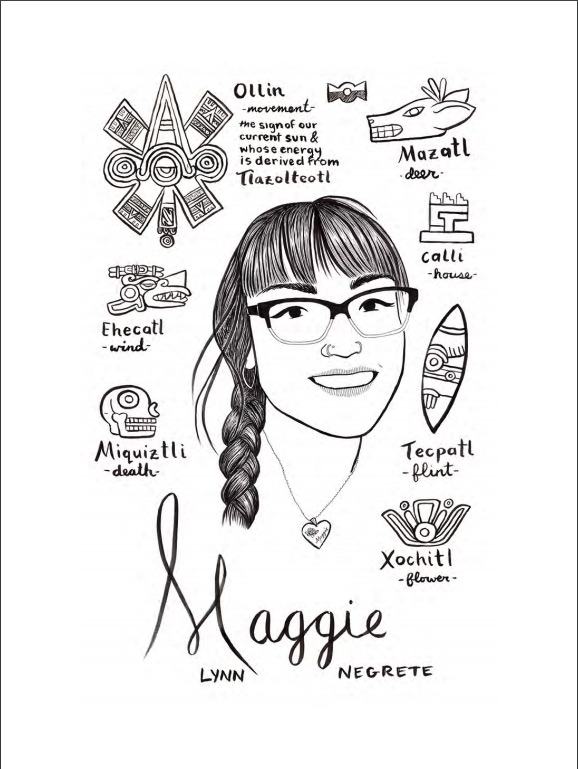

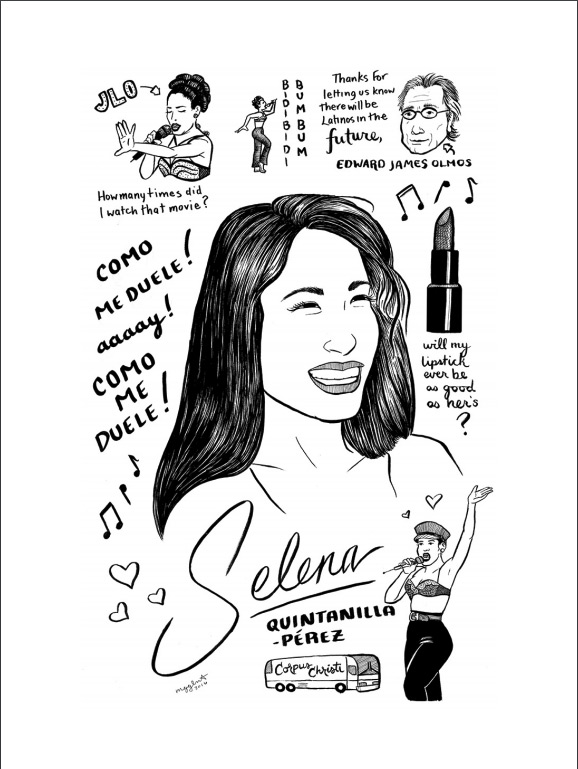
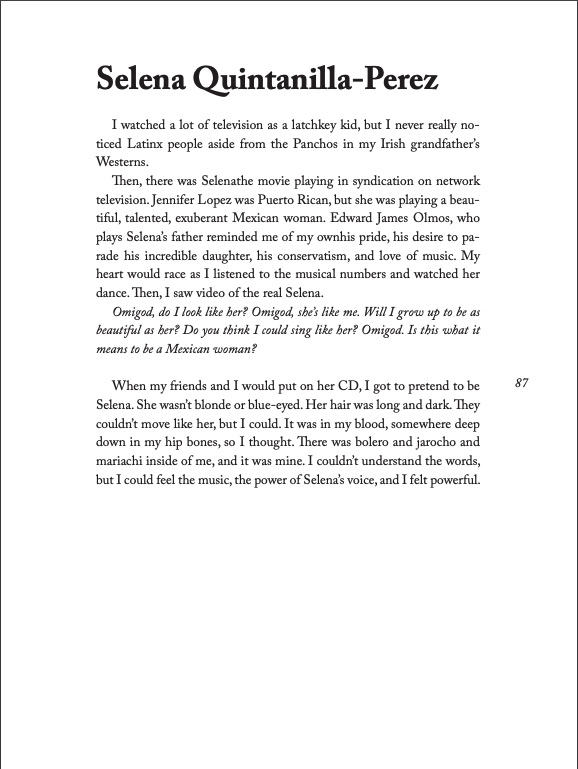
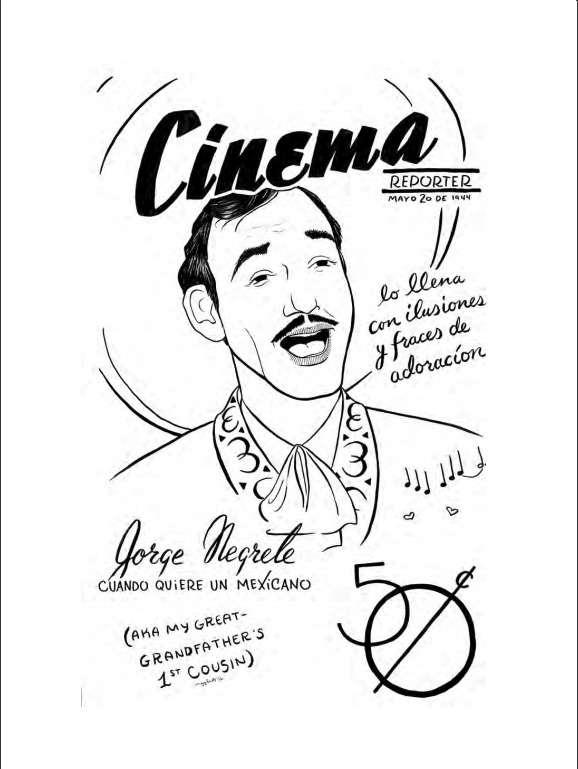
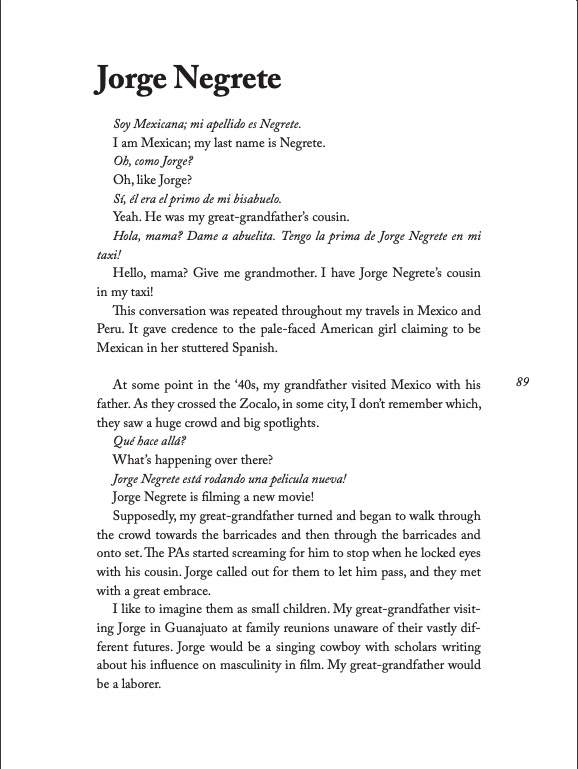
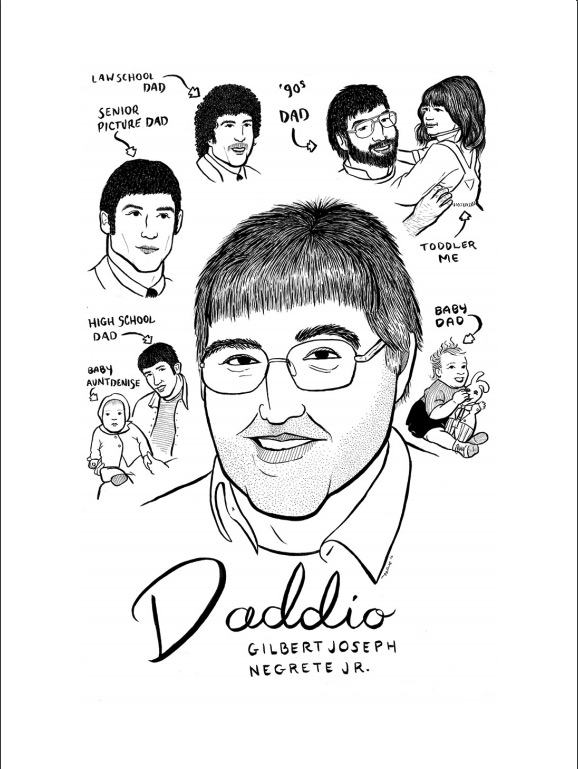

John Peña
Daily Geology (2013-2014)
John Peña
Daily Geology (2018-2019)
